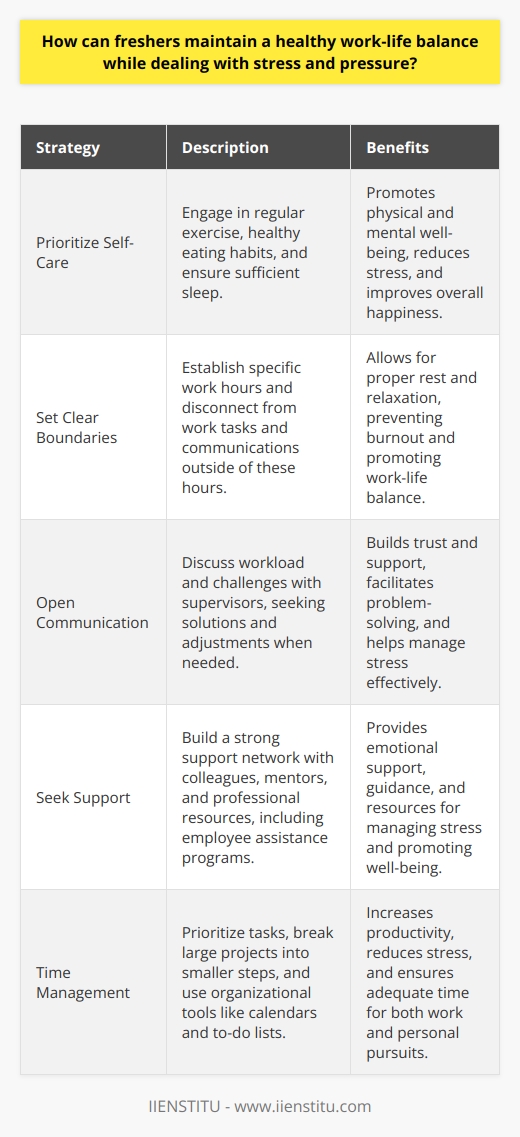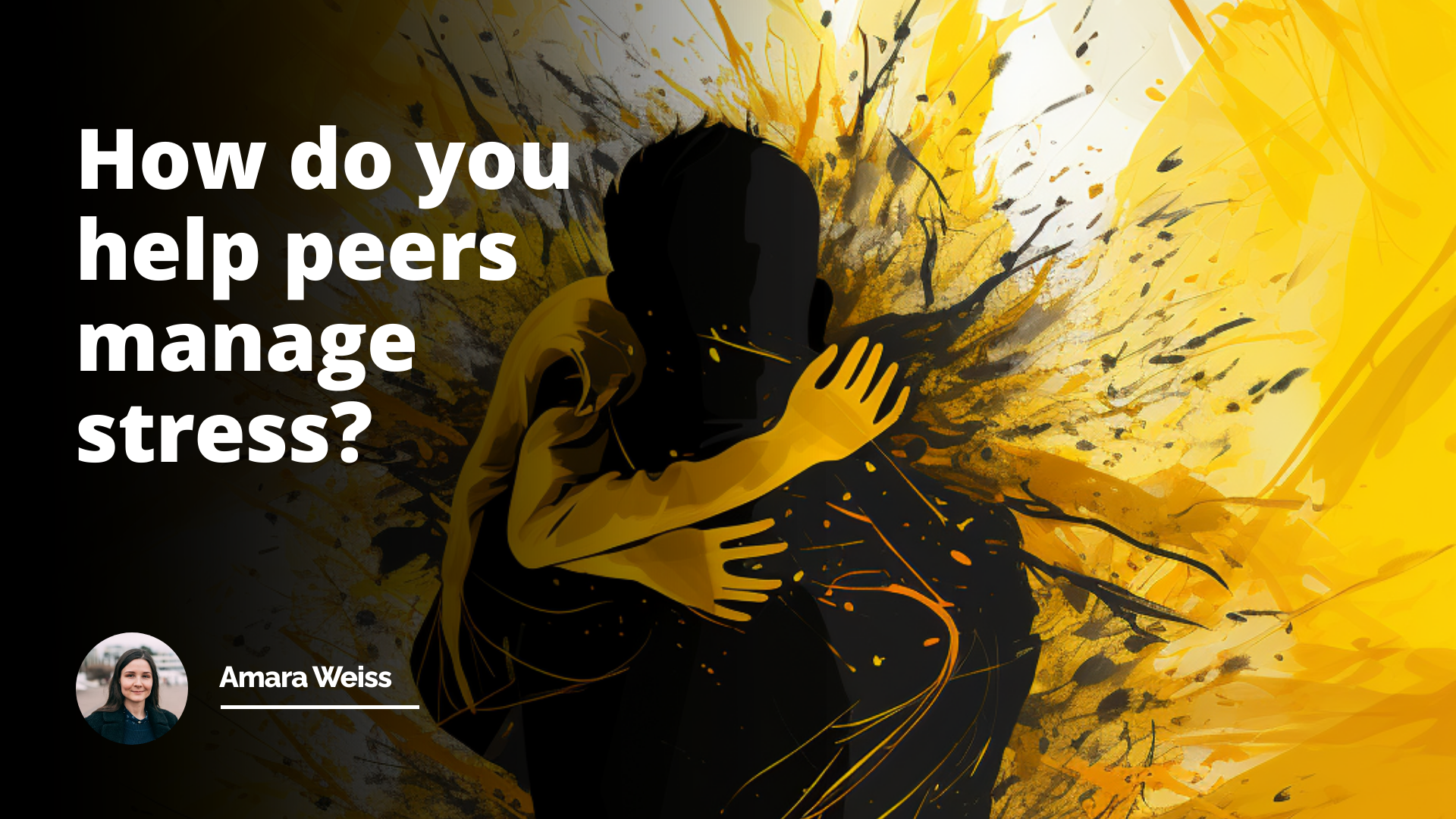
In today's fast-paced and demanding world, stress has become an inevitable part of our lives. As individuals, it is crucial that we not only manage our own stress levels but also extend a helping hand to our peers. In this article, we will explore the significance of supporting our colleagues and friends in managing stress effectively.
Whether you are an HR professional or a job candidate, understanding how to help peers manage stress is a valuable skill that can foster a positive work environment and improve overall well-being.
Why is this interview question asked: How to Support Your Peers in Managing Stress: Expert Advice
The question 'How do you help peers manage stress?' is often posed to applicants during job interviews because it reveals important qualities such as empathy, teamwork, leadership, and problem-solving skills. Employers understand the significance of a supportive work environment, where team members help each other navigate through difficult times and alleviate stress. This question aims to assess if a candidate possesses the necessary skills to contribute to such an environment.
Related Course: Leadership Development Course
The purpose of the question:
The purpose of this question is to gauge the candidate's ability to empathize and provide practical solutions to help colleagues manage stress effectively. It is an opportunity for the applicant to showcase their interpersonal skills, emotional intelligence, and their potential to foster a positive work culture.
At what interview level is it asked?
This question can be asked at different levels of the interview process, ranging from entry-level positions to senior management roles. Irrespective of the level, the ability to support and guide peers in stress management is considered crucial for overall team productivity and well-being.
Interview Question: How Do You Define Successful Time Management?
Interview Question: How Has Time Management Helped in Meeting Deadlines?
Related Course: Free Online Stress Management Course
What kind of answer is expected from the candidate?
When answering this question, the candidate should demonstrate their understanding of the importance of stress management and their ability to provide practical support to their peers. The ideal answer should reflect empathy, effective communication skills, and the ability to offer guidance, resources, and coping mechanisms tailored to each individual's needs.
Possible answers to consider:
Active Listening and Empathy: Helping peers manage stress starts with truly listening to their concerns and showing empathy. Encourage open conversations, allowing your colleagues to express their feelings and frustrations.
Emotional Support: Offer emotional support by acknowledging and validating their feelings. A simple gesture such as lending a listening ear or providing words of affirmation can make a significant difference.
Collaborative Problem-Solving: Help your peers identify the sources of their stress and work together to brainstorm strategies for effective stress management. Encourage them to prioritize tasks, set achievable goals, and establish healthy boundaries.
Promote Work-Life Balance: Encourage your peers to maintain a healthy work-life balance by setting realistic expectations and boundaries. Foster a culture that emphasizes the importance of rest, breaks, and self-care.
Share Stress-Management Resources: Be a reliable resource to your colleagues by sharing helpful articles, books, or online courses related to stress management, resilience, mindfulness, or time management.
Encourage Physical Activity: Promote the benefits of regular exercise and physical activity to your peers. Suggest taking short walks together during lunch breaks or participating in group fitness activities.
Supportive Work Environment: Advocate for a supportive work environment by promoting teamwork, positive feedback, and constructive communication. Encourage managers to implement stress-reduction initiatives such as flexible working hours, wellness programs, or meditation sessions.
Related Course: Time Management Online Course
What to consider when answering:
Tailor Your Approach: Each individual responds to stress differently. Consider their unique personality, preferences, and circumstances when providing support. This will help you offer personalized guidance and resources.
Confidentiality and Boundaries: Respect the privacy and confidentiality of your peers. Ensure that any discussions or information shared remains confidential unless it poses a threat to their well-being.
Continuous Learning: Stay updated on the latest research and strategies related to stress management. This will enable you to provide evidence-based support and share reliable resources with your peers.
In today's demanding work environment, supporting our peers in managing stress is not only essential for their well-being but also for fostering a positive and productive work culture. By actively listening, providing emotional support, promoting work-life balance, and sharing resources, we can help each other thrive in the face of stress.
By showcasing your ability to support peers in managing stress during an interview, you demonstrate your commitment to creating a supportive work environment that benefits everyone involved. Remember, a little support can go a long way!
Strategies for Stress Management
Techniques for Building Resilience
Similar interview questions:
What strategies can you suggest to assist your peers in managing stress effectively?
Which techniques have you found useful in aiding peers with stress management?
Could you provide some advice on supporting peers when they are dealing with stress?
In your experience, what methods have been successful in providing stress management guidance to peers?
Do you have any recommendations on how to assist peers with stress management effectively?
What steps do you take to help your peers effectively cope with stress?
Can you share any tips for aiding peers in managing their stress levels?
From your perspective, what approaches have proven helpful in supporting peers with stress?
Are there any specific ways you have found effective in helping peers manage stress?
What insights can you offer on promoting stress management among peers?

Frequently Asked Questions
How do you typically help your colleagues cope with stress in the workplace?
In the modern workplace, stress is a common issue that affects employees across all levels of an organization. As a colleague, there are several ways to help others cope with stress and maintain a healthy work environment. One effective method is to promote open communication and encourage coworkers to share their concerns and challenges. This creates a supportive atmosphere where individuals feel heard and validated. Additionally, offering practical assistance, such as helping with tasks or providing resources, can alleviate some of the pressure that contributes to stress.
Encouraging Work-Life Balance
Another way to support colleagues in managing stress is by advocating for a healthy work-life balance. This involves promoting reasonable work hours, respecting personal time, and encouraging breaks throughout the day. By setting a good example and prioritizing self-care, you can inspire others to do the same. Engaging in stress-reducing activities together, such as group yoga sessions or lunchtime walks, can also foster a sense of camaraderie and provide a much-needed respite from work-related pressures.
Recognizing Signs of Stress
It is crucial to be attentive to signs of stress among colleagues. Changes in behavior, such as increased irritability, decreased productivity, or social withdrawal, may indicate that someone is struggling. By recognizing these signs early on, you can offer support and guidance before the situation escalates. Approaching the individual with empathy and understanding, while maintaining confidentiality, can create a safe space for them to express their concerns and seek help if needed.
Promoting a Positive Work Culture
Fostering a positive work culture is essential in reducing stress levels within the workplace. This can be achieved by encouraging collaboration, celebrating successes, and promoting a growth mindset. Recognizing the efforts and achievements of colleagues, no matter how small, can boost morale and create a more positive atmosphere. Additionally, organizing team-building activities and social events can help strengthen relationships and provide opportunities for employees to unwind and connect on a personal level.
Seeking Professional Help
In some cases, stress may become overwhelming, and professional intervention may be necessary. As a colleague, it is important to be aware of the resources available within the organization, such as employee assistance programs or mental health support services. Encouraging individuals to seek help when needed and providing information about these resources can be a valuable way to support their well-being.
By implementing these strategies and fostering a supportive work environment, you can play a significant role in helping your colleagues manage stress and maintain optimal mental health. Remember, a healthy and resilient workforce is essential for the success and productivity of any organization.
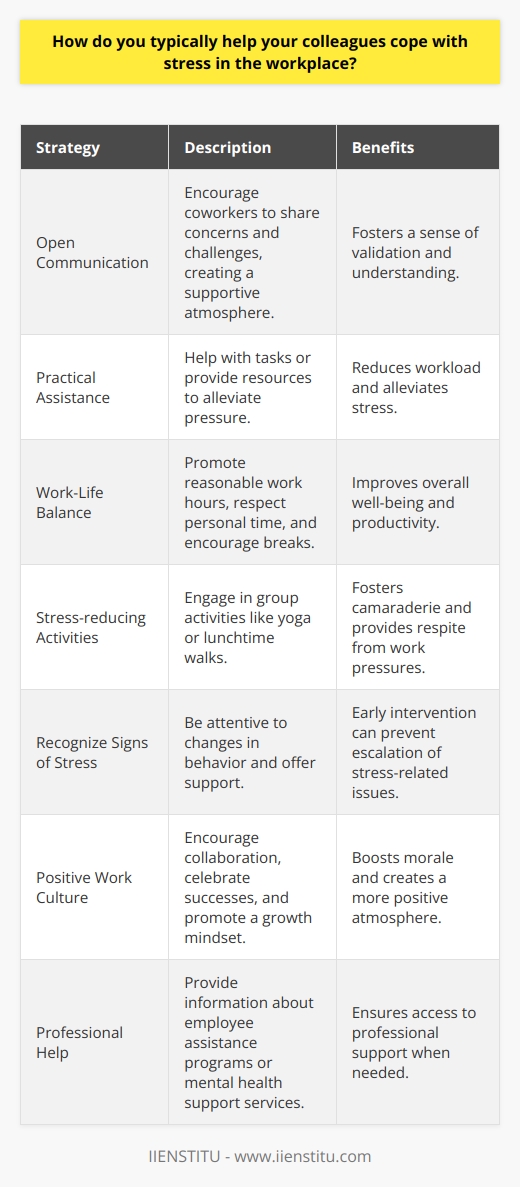
What strategies have you found to be most effective in assisting peers who are feeling overwhelmed or stressed?
Several strategies can be effective in assisting peers who are feeling overwhelmed or stressed. Active listening is crucial, as it allows the person to express their feelings and thoughts without judgment. Encouraging them to take breaks and engage in self-care activities, such as exercise, meditation, or hobbies, can help reduce stress levels. Offering practical support, like helping with tasks or providing resources, can alleviate some of their burdens. Sharing personal experiences and coping mechanisms can also provide comfort and reassurance. Ultimately, showing empathy, understanding, and a willingness to help can make a significant difference in supporting a stressed peer.
The Importance of Active Listening
Active listening is a fundamental skill when assisting a stressed peer. It involves giving them your full attention, avoiding interruptions, and engaging in non-verbal cues like maintaining eye contact and nodding. By creating a safe space for them to express their feelings, you demonstrate that their concerns are valid and heard. Avoid offering advice or solutions immediately; instead, focus on understanding their perspective and acknowledging their emotions. This approach helps build trust and rapport, making it easier for them to open up and feel supported.
Encouraging Self-Care and Stress-Reduction Techniques
When a peer is overwhelmed, encouraging them to prioritize self-care is essential. Suggest taking regular breaks, even if only for a few minutes, to help them recharge and refocus. Promote stress-reduction techniques like deep breathing exercises, progressive muscle relaxation, or mindfulness meditation. These practices can help calm the mind and body, reducing the immediate effects of stress. Additionally, emphasize the importance of maintaining a balanced lifestyle, including regular exercise, a healthy diet, and sufficient sleep. Engaging in hobbies or activities they enjoy can also provide a much-needed distraction and boost their mood.
Offering Practical Support and Resources
Sometimes, the best way to assist a stressed peer is by offering practical support. This can include helping them break down tasks into manageable steps, providing assistance with specific assignments or projects, or connecting them with relevant resources. For example, if they are struggling with time management, you could recommend using a planner or introducing them to productivity apps. If their stress stems from academic challenges, guide them towards tutoring services or study groups. By offering tangible solutions and resources, you demonstrate your willingness to help and empower them to take control of their situation.
Sharing Personal Experiences and Coping Mechanisms
Sharing your own experiences with stress and the coping mechanisms you've found effective can be a powerful way to support a peer. It helps normalize their feelings and shows that they are not alone in their struggles. Be honest about the challenges you've faced and the strategies that have worked for you, whether it's practicing yoga, journaling, or seeking support from others. This vulnerability fosters a sense of connection and can inspire them to try new approaches to managing their stress. However, be mindful not to minimize their experiences or compare situations; instead, focus on validating their feelings and offering hope.
The Power of Empathy and Understanding
Above all, showing empathy and understanding is crucial when supporting a stressed peer. Validate their feelings and acknowledge the challenges they are facing. Use phrases like "I can imagine how overwhelming this must feel" or "It's understandable to be stressed in this situation" to convey your support. Avoid dismissive statements like "just relax" or "it's not a big deal," as they can make the person feel unheard or misunderstood. Instead, emphasize that you are there for them and willing to listen and help in any way you can. Sometimes, simply knowing that someone cares and understands can make a world of difference to someone who is feeling overwhelmed.
In conclusion, assisting peers who are feeling overwhelmed or stressed requires a combination of active listening, encouraging self-care, offering practical support, sharing personal experiences, and showing empathy. By implementing these strategies, you can create a supportive environment that helps your peers navigate challenging times and build resilience. Remember, everyone experiences stress differently, so be patient, non-judgmental, and adaptable in your approach. Your support and understanding can play a significant role in helping your peers manage their stress and maintain their well-being.
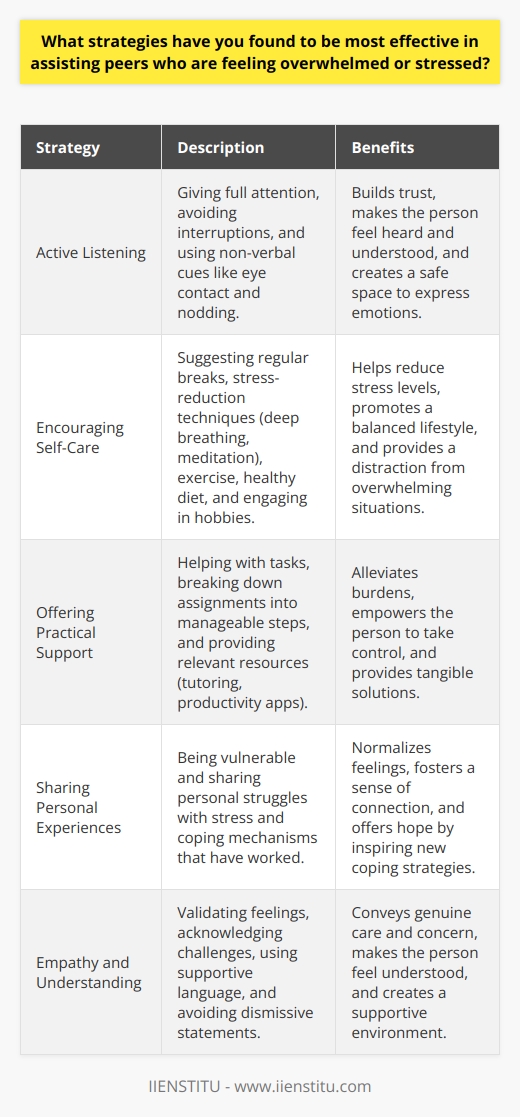
Can you provide an example of a time when you successfully supported a coworker in managing their stress levels?
Supporting coworkers in managing their stress levels is crucial for maintaining a healthy and productive work environment. One notable example of successfully assisting a colleague occurred during a particularly challenging project. My coworker, who was leading the project, found herself overwhelmed by the demands and tight deadlines.
Recognizing the Signs of Stress
I noticed that my coworker was exhibiting signs of increased stress, such as irritability and difficulty concentrating. She was working long hours and appeared visibly exhausted. Recognizing these indicators prompted me to take action and offer my support.
Initiating a Conversation
I approached my coworker privately and expressed my concern for her well-being. I asked if she was feeling overwhelmed and offered to listen to her concerns. By creating a safe and supportive space, I encouraged her to share her struggles openly.
Active Listening and Empathy
As my coworker shared her concerns, I practiced active listening and demonstrated empathy. I validated her feelings and acknowledged the challenges she was facing. By showing understanding and compassion, I helped her feel heard and supported.
Offering Practical Assistance
After gaining a better understanding of her situation, I offered practical assistance to alleviate her workload. I volunteered to take on some of her tasks and collaborated with other team members to redistribute responsibilities. This helped reduce her immediate stress levels and provided her with some much-needed relief.
Encouraging Self-Care and Stress Management Techniques
In addition to practical support, I encouraged my coworker to prioritize self-care and stress management. I shared some techniques that I found helpful, such as deep breathing exercises and taking short breaks throughout the day. I also suggested that she communicate her needs to our supervisor and seek additional resources if necessary.
Following Up and Ongoing Support
I made a point to check in with my coworker regularly to ensure that she was coping well. I offered ongoing support and encouragement, reminding her that she was not alone in facing these challenges. By maintaining open communication and demonstrating a willingness to help, I fostered a supportive and collaborative work environment.
The Positive Outcome
As a result of the support provided, my coworker was able to manage her stress more effectively. She expressed gratitude for the assistance and felt more confident in her ability to handle the project demands. Our team dynamics improved, and we successfully completed the project within the given timeframe.
Conclusion
Supporting coworkers in managing stress is essential for promoting a healthy and productive workplace. By recognizing signs of stress, offering practical assistance, encouraging self-care, and providing ongoing support, we can help our colleagues navigate challenging times and foster a supportive work environment.
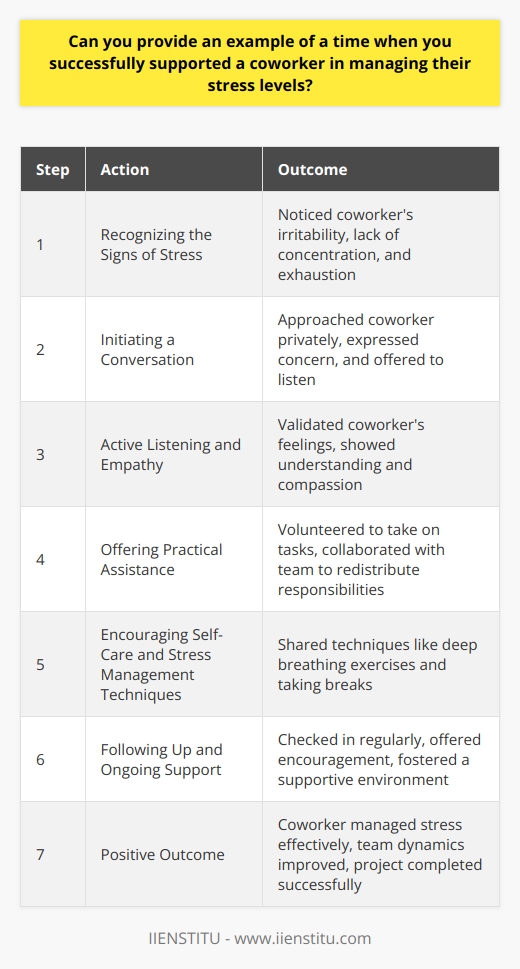
How do you help your peers manage stress in the workplace?
Helping peers manage stress in the workplace is crucial for maintaining a healthy and productive work environment. There are several strategies that individuals can employ to support their colleagues in reducing stress levels. One effective approach is to foster open communication and encourage peers to share their concerns and challenges. By creating a safe and non-judgmental space for dialogue, individuals can help their colleagues feel heard and validated, reducing feelings of isolation and overwhelming stress.
Promoting Work-Life Balance
Another key aspect of helping peers manage stress is to advocate for and model healthy work-life balance. Encouraging colleagues to set boundaries between their personal and professional lives can help prevent burnout and reduce stress levels. This can involve promoting the importance of taking regular breaks, using vacation time, and engaging in hobbies or activities outside of work. By setting a positive example and prioritizing self-care, individuals can inspire their peers to do the same.
Offering Practical Support
In addition to emotional support, offering practical assistance can also help alleviate stress for peers. This can include volunteering to take on extra tasks during particularly busy periods, sharing resources or information that may be helpful, or collaborating on projects to distribute workload more evenly. By providing tangible support, individuals can help their colleagues feel more equipped to handle the demands of their roles, reducing overall stress levels.
Encouraging Professional Development
Investing in professional development opportunities can also play a role in helping peers manage stress. By encouraging colleagues to attend workshops, seminars, or training sessions related to stress management, time management, or other relevant skills, individuals can help their peers acquire new tools and strategies for coping with workplace challenges. Additionally, promoting a culture of continuous learning and growth can foster a sense of purpose and engagement, which can help combat stress and burnout.
Recognizing and Celebrating Achievements
Finally, taking the time to recognize and celebrate the achievements and successes of peers can be a powerful way to help manage stress. By acknowledging the hard work and dedication of colleagues, individuals can help boost morale, increase feelings of appreciation, and foster a positive work environment. This can involve simple gestures like expressing gratitude for a job well done, or more formal recognition programs that highlight outstanding contributions. By focusing on the positive aspects of work and celebrating milestones, individuals can help their peers maintain a sense of perspective and motivation, even in the face of stress and challenges.
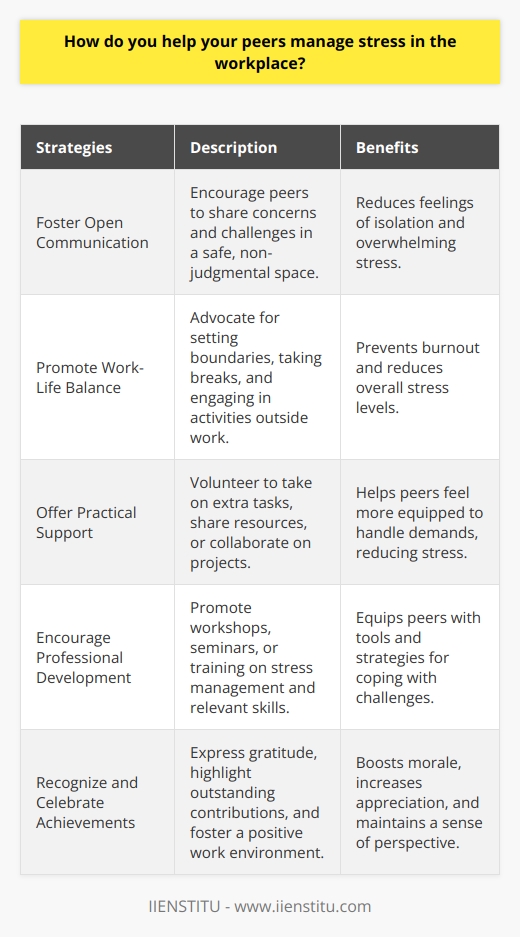
What strategies do you employ to assist colleagues in coping with stressful situations?
Assisting colleagues in coping with stressful situations is crucial for maintaining a healthy and productive work environment. Several strategies can be employed to support coworkers during challenging times.
Active Listening and Empathy
One of the most effective ways to help colleagues is by actively listening to their concerns. Provide a non-judgmental ear and show empathy for their situation. Validate their feelings and acknowledge the challenges they face.
Encourage Open Communication
Create a safe space for colleagues to express their thoughts and emotions openly. Encourage them to share their concerns and offer support. Regularly check in with them to see how they are coping.
Offer Practical Support
Identify practical ways to alleviate stress for your colleagues. Offer to take on some of their tasks or responsibilities temporarily. Help them prioritize their workload and break tasks into manageable chunks.
Share Stress Management Techniques
Introduce your colleagues to stress management techniques that have worked for you. This could include deep breathing exercises, meditation, or physical activities. Encourage them to take regular breaks and engage in self-care practices.
Promote Work-Life Balance
Emphasize the importance of maintaining a healthy work-life balance. Encourage colleagues to set boundaries between their personal and professional lives. Support flexible working arrangements when possible to help them manage their stress levels.
Foster a Positive Work Environment
Contribute to creating a positive and supportive work environment. Celebrate successes, acknowledge achievements, and promote a culture of collaboration. Organize team-building activities to strengthen relationships and boost morale.
Provide Resources and Support Systems
Make colleagues aware of available resources and support systems within the organization. This could include employee assistance programs, counseling services, or stress management workshops. Encourage them to seek professional help if needed.
Lead by Example
As a colleague, lead by example in managing stress. Demonstrate healthy coping mechanisms and maintain a positive attitude. Your actions can inspire and influence others to adopt similar strategies.
Remember, everyone reacts to stress differently. Be patient, understanding, and adaptable in your approach to supporting colleagues. Regularly assess the effectiveness of your strategies and make adjustments as needed. By working together and providing ongoing support, you can create a resilient and thriving work environment.
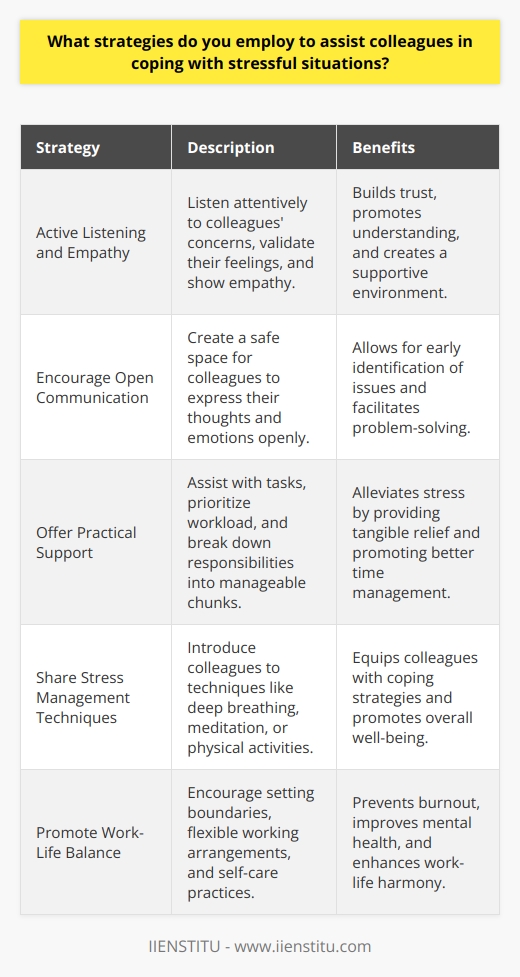
In what ways do you support your coworkers in managing their stress levels effectively?
Supporting coworkers in managing their stress levels is crucial for maintaining a healthy and productive work environment. One effective way to help colleagues cope with stress is by promoting open communication and active listening. Encourage coworkers to share their concerns and feelings, and provide a non-judgmental ear to listen to their struggles. By creating a safe space for honest dialogue, you can help them process their emotions and gain a fresh perspective on their challenges.
Encouraging Work-Life Balance
Another way to support coworkers in managing stress is by advocating for a healthy work-life balance. Encourage them to set boundaries between their professional and personal lives, and respect those boundaries yourself. Promote the importance of taking regular breaks throughout the workday, and suggest engaging in stress-relieving activities such as stretching, meditation, or short walks. By modeling a balanced lifestyle yourself, you can inspire your colleagues to prioritize their well-being.
Offering Practical Assistance
In addition to emotional support, offering practical assistance can go a long way in reducing coworkers' stress levels. If you notice a colleague struggling with a heavy workload or a challenging project, offer to lend a helping hand. Collaborate with them to break down tasks into manageable chunks, and provide guidance or resources when needed. By showing a willingness to support them in their work, you can alleviate some of the pressure they may be experiencing.
Promoting a Positive Work Culture
Fostering a positive and supportive work culture is essential for managing stress levels among coworkers. Encourage a spirit of teamwork and collaboration, where individuals feel comfortable relying on each other for support. Celebrate successes and milestones together, and acknowledge the efforts and contributions of your colleagues. By creating an environment that values employee well-being and recognizes the importance of stress management, you can help your coworkers feel more supported and empowered to handle challenges.
Encouraging Professional Development
Investing in your coworkers' professional development can also contribute to reducing their stress levels. Encourage them to attend workshops, seminars, or training sessions that focus on stress management techniques, time management skills, or resilience building. By providing opportunities for personal and professional growth, you can help your colleagues develop the tools and strategies they need to effectively cope with stress in the workplace.
Remember, supporting your coworkers in managing stress is an ongoing process that requires patience, empathy, and a genuine commitment to their well-being. By consistently offering support, creating a positive work environment, and promoting healthy habits, you can make a significant difference in helping your colleagues navigate the challenges of the modern workplace.
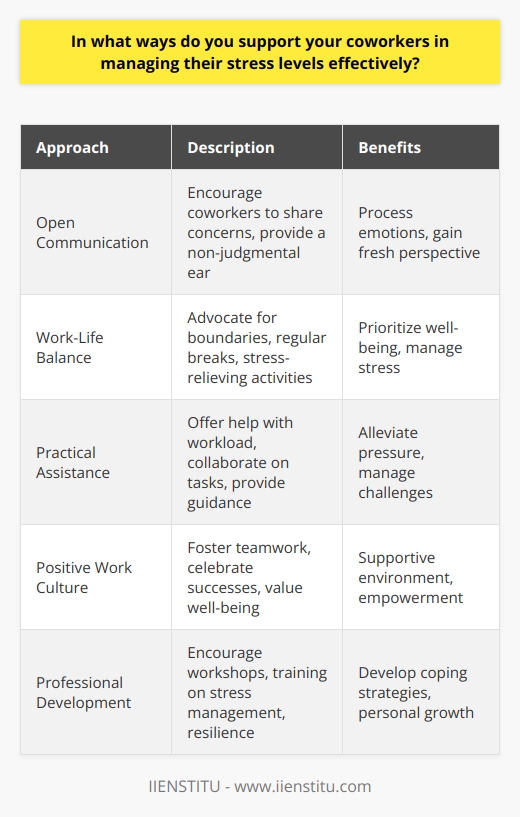
How do you typically handle stress and pressure in the workplace?
Handling stress and pressure in the workplace is a critical skill for maintaining productivity and well-being. Effective stress management techniques can help individuals cope with challenging situations and prevent burnout. This article explores various strategies for managing stress and pressure in professional settings.
Identifying Stressors
The first step in managing stress is to identify the sources of pressure in your work environment. Common stressors may include tight deadlines, heavy workloads, interpersonal conflicts, or lack of resources. By recognizing these triggers, you can develop targeted strategies to address them.
Time Management and Prioritization
Effective time management is crucial for reducing stress in the workplace. Prioritize tasks based on importance and urgency. Use tools like calendars, to-do lists, and project management software to stay organized and on track. Break large projects into smaller, manageable tasks to avoid feeling overwhelmed.
Delegation and Collaboration
Delegating tasks to team members can help distribute the workload and alleviate pressure. Collaborate with colleagues to brainstorm solutions and share responsibilities. Effective communication and teamwork can foster a supportive work environment and reduce individual stress levels.
Self-Care and Stress-Reduction Techniques
Engaging in self-care activities can help manage stress and maintain a healthy work-life balance. Regular exercise, a balanced diet, and sufficient sleep are essential for physical and mental well-being. Incorporate stress-reduction techniques like deep breathing, meditation, or mindfulness practices into your daily routine.
Setting Boundaries
Establish clear boundaries between work and personal life to prevent work-related stress from spilling over. Communicate your availability and limitations to colleagues and supervisors. Learn to say no to unreasonable requests or tasks that exceed your capacity.
Seeking Support
Don't hesitate to seek support when dealing with stress and pressure in the workplace. Reach out to a trusted colleague, supervisor, or mentor for guidance and advice. Many organizations offer employee assistance programs that provide counseling and resources for stress management.
Professional Development and Training
Investing in professional development and training can enhance your skills and confidence, reducing stress associated with job demands. Attend workshops, seminars, or online courses to expand your knowledge and stay updated in your field.
Maintaining a Positive Attitude
Cultivating a positive attitude can help you navigate stressful situations more effectively. Focus on the aspects of your job that you enjoy and find fulfilling. Celebrate your accomplishments and learn from setbacks. Surround yourself with supportive and optimistic colleagues who can help maintain a positive work environment.
Conclusion
Managing stress and pressure in the workplace is an ongoing process that requires self-awareness, proactive strategies, and a commitment to self-care. By identifying stressors, implementing effective time management techniques, seeking support, and maintaining a positive attitude, individuals can successfully navigate the challenges of their professional lives and maintain optimal performance and well-being.
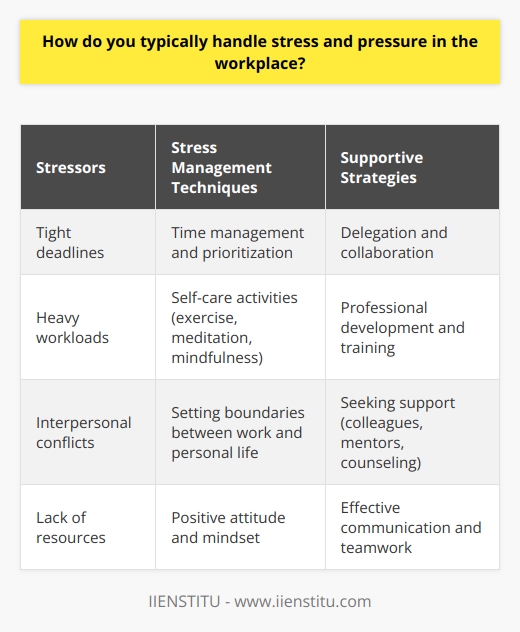
What strategies have you found effective in managing stress during challenging situations?
Effective stress management strategies during challenging situations can significantly improve one's overall well-being and productivity. Incorporating regular exercise into your routine can help reduce stress levels and promote mental clarity. Engaging in physical activities such as jogging, yoga, or even a brisk walk can release endorphins, which are natural mood enhancers. Additionally, practicing mindfulness techniques, including deep breathing exercises and meditation, can help you stay grounded and focused during stressful periods.
Prioritize Tasks and Set Realistic Goals
When faced with overwhelming challenges, it's essential to prioritize tasks and set realistic goals. Break down larger tasks into smaller, manageable steps to avoid feeling overwhelmed. Create a to-do list and tackle the most important or time-sensitive tasks first. Celebrate small victories along the way to maintain motivation and a positive outlook. Remember to be flexible and adjust your goals as needed, depending on the situation.
Maintain a Healthy Work-Life Balance
Achieving a healthy work-life balance is crucial for managing stress during challenging times. Set clear boundaries between your work and personal life to avoid burnout. Make time for hobbies, relaxation, and social interactions with friends and family. Engaging in activities you enjoy can help you unwind and recharge, allowing you to approach challenges with a fresh perspective.
Practice Effective Communication and Seek Support
Open and honest communication is key when dealing with stressful situations, particularly in professional settings. Don't hesitate to ask for help or clarification when needed. Collaborate with colleagues and supervisors to find solutions and distribute workload evenly. In personal life, reach out to trusted friends, family members, or even a therapist for emotional support and guidance. Sharing your concerns and feelings can help alleviate stress and provide a fresh outlook.
Maintain a Positive Mindset and Practice Self-Care
Cultivating a positive mindset can significantly impact how you cope with stress during challenging times. Practice positive self-talk and focus on solutions rather than dwelling on problems. Celebrate your successes, no matter how small, and learn from setbacks. Engage in regular self-care activities, such as taking relaxing baths, reading a book, or treating yourself to a favorite meal. Prioritizing your physical and mental health will help you build resilience and better manage stress.
Conclusion
Implementing effective stress management strategies during challenging situations is essential for maintaining overall well-being and productivity. By prioritizing tasks, setting realistic goals, maintaining a healthy work-life balance, practicing effective communication, seeking support, and maintaining a positive mindset, individuals can successfully navigate stressful periods. Remember that everyone copes with stress differently, so it's important to find the strategies that work best for you and adapt them as needed.
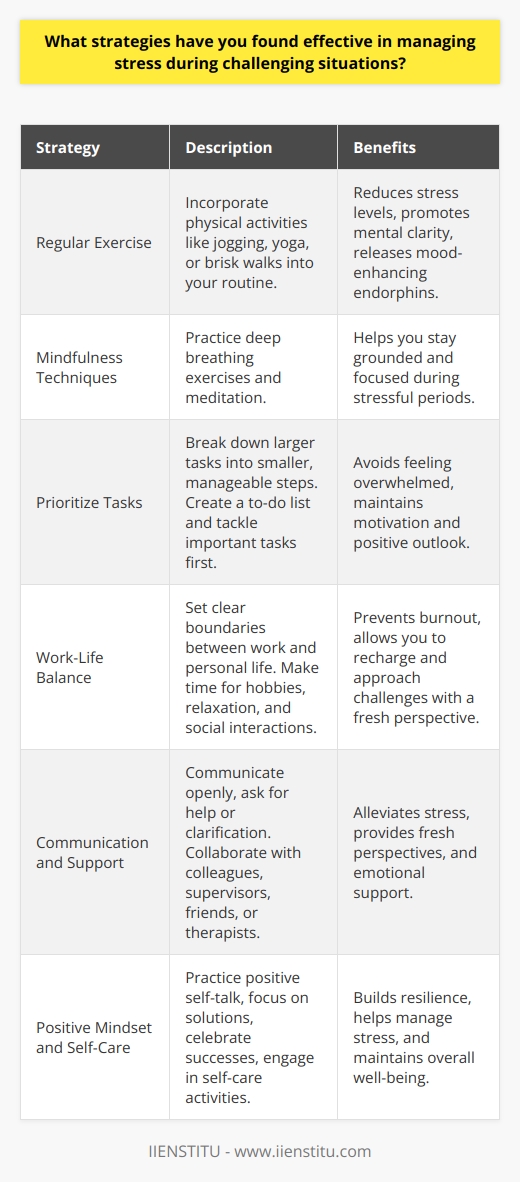
Can you describe a time when you successfully dealt with a high-pressure situation at work?
One instance of successfully handling a high-pressure situation at work involved a critical project with a tight deadline. The client suddenly requested significant changes just days before the submission date. As the team leader, I quickly assessed the situation and developed a plan of action.
Effective Communication and Delegation
I immediately communicated the revised requirements to my team and allocated tasks based on each member's strengths. By clearly explaining the situation and setting clear expectations, I ensured everyone understood the urgency and their roles. Regular check-ins kept the team aligned and informed.
Prioritizing and Time Management
To meet the deadline, I prioritized tasks and focused on the most critical aspects of the project. I created a detailed timeline, breaking down the work into manageable segments. This allowed the team to concentrate on one task at a time, minimizing distractions and maximizing efficiency.
Collaborative Problem-Solving
Throughout the process, I encouraged open communication and collaboration among team members. We held brainstorming sessions to identify potential roadblocks and develop creative solutions. By fostering a supportive environment, we were able to tackle challenges together and maintain a positive outlook.
Staying Calm Under Pressure
Despite the high-stress situation, I remained composed and focused. I led by example, maintaining a calm demeanor and providing guidance and support to my team. By staying level-headed, I was able to make clear decisions and keep the team motivated.
Leveraging Resources and Expertise
I recognized the importance of utilizing all available resources to meet the tight deadline. I reached out to colleagues from other departments who had relevant expertise and sought their assistance. By collaborating with others and leveraging their knowledge, we were able to overcome obstacles more efficiently.
Continuous Progress Monitoring
Throughout the project, I closely monitored our progress and made necessary adjustments to ensure we stayed on track. Regular status updates to stakeholders kept them informed and helped manage expectations. By proactively identifying and addressing potential issues, we minimized delays and maintained momentum.
Successful Outcome and Lessons Learned
Through effective communication, prioritization, collaboration, and staying calm under pressure, we successfully completed the project on time. The client was satisfied with the results, and our team emerged stronger and more resilient. This experience taught me the importance of adaptability, teamwork, and effective leadership in high-pressure situations.
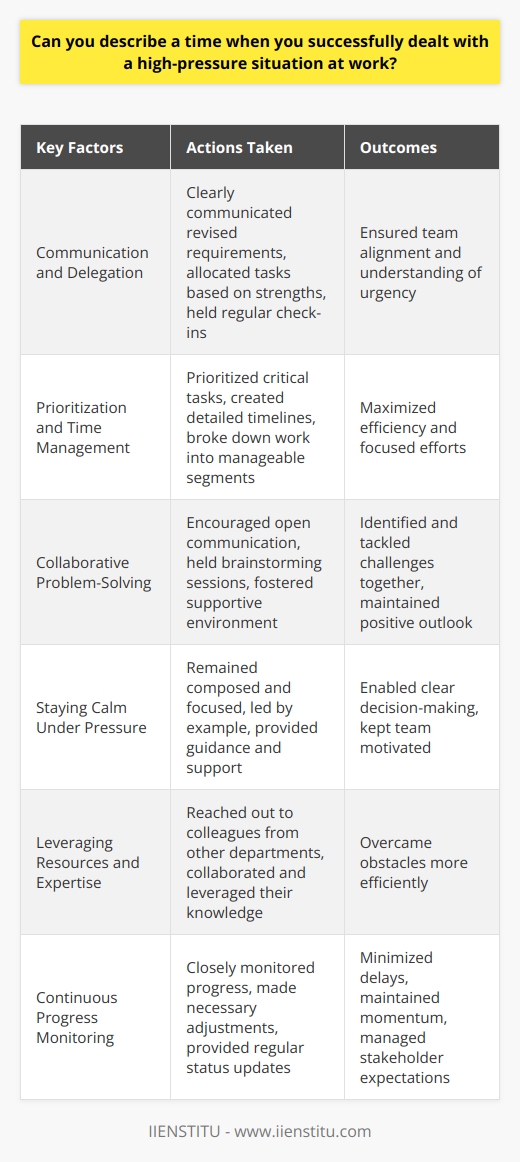
How do you typically handle stress and pressure in the workplace?
Handling stress and pressure in the workplace is a critical skill for maintaining productivity and well-being. Effective stress management techniques can help individuals cope with demanding situations and prevent burnout. This paragraph explores various strategies for managing stress and pressure in professional settings.
Prioritizing Tasks and Time Management
One key approach to managing stress in the workplace is through effective prioritization and time management. By identifying and focusing on high-priority tasks, individuals can ensure that they are addressing the most critical responsibilities first. Breaking larger projects into smaller, manageable steps can also help reduce feelings of overwhelm and make progress more achievable.
Creating a schedule and adhering to it
Creating a schedule and adhering to it can help individuals stay organized and on track. This may involve setting specific time blocks for different tasks, allowing for breaks, and minimizing distractions. Effective time management can help reduce stress by providing a sense of control and accomplishment.
Communicating Effectively with Colleagues and Supervisors
Open and honest communication is another important factor in managing workplace stress. When individuals feel overwhelmed or under pressure, it is essential to communicate their concerns and needs to colleagues and supervisors. This can help foster a supportive work environment and ensure that expectations are clear and realistic.
Seeking support and delegating tasks when necessary
Seeking support from coworkers or supervisors can also help alleviate stress. Delegating tasks, when appropriate, can distribute workload more evenly and prevent individuals from becoming overburdened. Collaborating with team members can also provide a sense of shared responsibility and reduce feelings of isolation.
Maintaining Work-Life Balance
Maintaining a healthy work-life balance is crucial for managing stress and preventing burnout. Setting clear boundaries between work and personal life can help individuals recharge and avoid feeling constantly connected to their job. This may involve establishing specific work hours, disconnecting from work-related technology outside of those hours, and engaging in hobbies or activities that promote relaxation and well-being.
Engaging in stress-reducing activities outside of work
Engaging in stress-reducing activities outside of work can also help individuals manage pressure more effectively. This may include exercise, meditation, spending time with loved ones, or pursuing creative outlets. By prioritizing self-care and maintaining a fulfilling personal life, individuals can build resilience and better cope with workplace challenges.
Seeking Professional Help When Needed
In some cases, workplace stress may become overwhelming and require additional support. Seeking professional help, such as counseling or therapy, can provide individuals with tools and strategies for managing stress and improving mental health. Many workplaces also offer employee assistance programs (EAPs) that provide confidential counseling and resources for managing work-related stress.
By implementing these strategies and prioritizing self-care, individuals can more effectively handle stress and pressure in the workplace. Developing strong stress management skills not only benefits personal well-being but also contributes to a more positive and productive work environment for all.

What strategies have you found most effective for managing stress and pressure?
Effective stress and pressure management strategies involve a combination of mental, physical, and social approaches. One of the most important techniques is practicing mindfulness, which involves focusing on the present moment and accepting thoughts and feelings without judgment. This can be achieved through meditation, deep breathing exercises, or simply taking a few minutes each day to quiet the mind and focus on the breath.
Another crucial aspect of managing stress is maintaining a healthy lifestyle. Regular exercise, such as jogging, swimming, or yoga, can help reduce stress levels and improve overall well-being. Eating a balanced diet rich in fruits, vegetables, whole grains, and lean proteins can also contribute to better stress management. Additionally, getting enough quality sleep is essential for both physical and mental health, as it allows the body and mind to recharge and cope with daily stressors more effectively.
Prioritizing and Time Management
Effective time management and prioritization of tasks can significantly reduce stress levels. Breaking down large projects into smaller, manageable steps and setting realistic goals can help individuals feel more in control of their workload. Learning to say "no" to non-essential commitments and delegating tasks when possible can also alleviate pressure.
Social Support and Communication
Maintaining a strong support network of friends, family, and colleagues is crucial for managing stress. Talking about concerns and feelings with trusted individuals can provide a fresh perspective and emotional support. Open communication with supervisors or professors about workload and expectations can also help reduce stress levels in academic or professional settings.
Hobbies and Relaxation Techniques
Engaging in hobbies and activities that bring joy and relaxation can be powerful stress-management tools. This can include reading, painting, playing music, or spending time in nature. Incorporating relaxation techniques, such as progressive muscle relaxation or guided imagery, into daily routines can also help reduce stress and promote a sense of calm.
Professional Help
When stress and pressure become overwhelming, seeking professional help from a therapist or counselor can be beneficial. They can provide additional coping strategies and support tailored to individual needs. Many educational institutions and workplaces offer counseling services or employee assistance programs that can be valuable resources for managing stress.
In conclusion, managing stress and pressure effectively involves a multifaceted approach that includes mindfulness, healthy lifestyle choices, time management, social support, engaging in hobbies, and seeking professional help when needed. By incorporating these strategies into daily life, individuals can build resilience and better navigate the challenges of academic and professional environments.
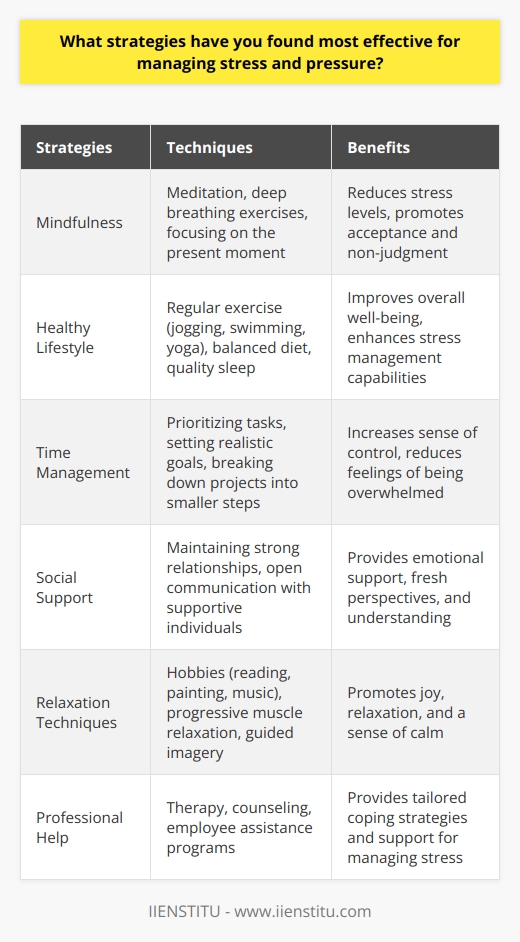
Can you describe a time when you successfully handled a high-pressure situation, and how did you approach it?
Handling high-pressure situations effectively is a crucial skill in both personal and professional life. One such instance where I successfully navigated a challenging situation was during my final year of college. As the lead organizer of a major student conference, I faced numerous obstacles and tight deadlines that put me under immense pressure.
Assessing the Situation and Creating a Plan
When confronted with this high-pressure scenario, my first step was to assess the situation objectively. I identified the key challenges, such as limited time, budget constraints, and the need to coordinate multiple teams. By breaking down the problem into smaller, manageable components, I could create a clear plan of action.
I prioritized tasks based on their urgency and importance, ensuring that critical aspects of the conference were addressed first. This helped me focus my efforts and allocate resources efficiently, minimizing wasted time and energy.
Communicating Effectively and Delegating Responsibilities
Effective communication played a vital role in handling this high-pressure situation. I regularly updated my team members on our progress, goals, and any changes in the plan. This transparency fostered a sense of unity and purpose among the team, keeping everyone motivated and informed.
Recognizing the importance of delegation, I assigned tasks to team members based on their strengths and expertise. By entrusting responsibilities to capable individuals, I could focus on overseeing the bigger picture and addressing any unexpected challenges that arose.
Staying Calm and Adaptable
Throughout the high-pressure situation, I made a conscious effort to remain calm and composed. I understood that panicking or succumbing to stress would only hinder my ability to think clearly and make sound decisions. By maintaining a level-headed approach, I could navigate the challenges more effectively.
Adaptability and Flexibility
Being adaptable was crucial in handling the high-pressure situation. When unforeseen obstacles emerged, I quickly reassessed my plans and made necessary adjustments. This flexibility allowed me to find alternative solutions and keep the conference on track, despite the setbacks.
Learning from the Experience
Reflecting on this high-pressure situation, I gained valuable insights into my own abilities and leadership skills. I learned the importance of thorough planning, effective communication, and the power of remaining calm under pressure. These lessons have served me well in subsequent challenging situations, both personally and professionally.
Conclusion
Successfully handling a high-pressure situation requires a combination of careful planning, effective communication, adaptability, and a calm demeanor. By breaking down the problem, delegating responsibilities, and staying focused on the end goal, one can navigate even the most challenging circumstances with grace and resilience.
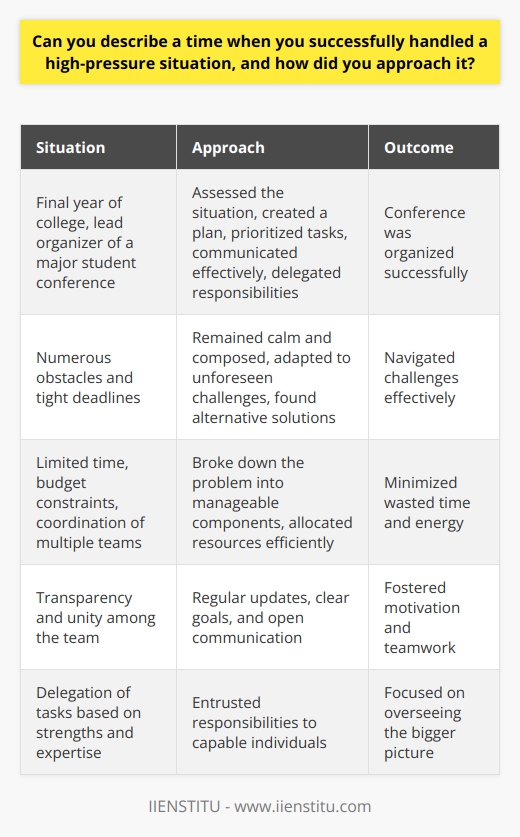
What are some common sample stress interview questions and how should they be answered?
Stress interviews are designed to test a candidate's ability to handle pressure and think on their feet. Some common stress interview questions include:
1. "How do you handle conflict with a coworker?"
When answering this question, focus on your problem-solving skills and ability to remain professional. Describe a specific situation where you successfully resolved a conflict through open communication and collaboration.
Example answer:
"In my previous role, I had a disagreement with a coworker regarding project responsibilities. I scheduled a meeting with them to discuss the issue calmly and openly. We identified the root of the problem and developed a solution that satisfied both parties. The experience taught me the importance of addressing conflicts promptly and professionally."
2. "Tell me about a time when you failed."
Interviewers ask this question to assess your ability to learn from mistakes and overcome challenges. Be honest about a failure, but focus on the lessons learned and how you grew from the experience.
Example answer:
"In my previous job, I missed an important deadline due to poor time management. I took responsibility for my mistake and apologized to my team and supervisor. To prevent future occurrences, I implemented a more effective time management system and improved my communication with team members. The experience taught me the importance of organization and accountability."
3. "How do you handle working under tight deadlines?"
This question assesses your ability to prioritize tasks and work efficiently under pressure. Discuss your strategies for managing stress and ensuring quality work within time constraints.
Example answer:
"When working under tight deadlines, I prioritize my tasks based on importance and urgency. I break down larger projects into smaller, manageable steps and set mini-deadlines for each task. I also communicate openly with my team and supervisor to ensure everyone is on the same page and to address any potential obstacles early on. By staying organized and focused, I am able to consistently meet deadlines without compromising the quality of my work."
4. "What would you do if you discovered your boss was engaging in unethical behavior?"
This question gauges your integrity and ability to handle sensitive situations. Emphasize your commitment to ethical behavior and your understanding of proper reporting procedures.
Example answer:
"If I discovered my boss engaging in unethical behavior, I would first document the incident thoroughly. I would then report the matter to the appropriate personnel, such as the HR department or a higher-level manager, following the company's established procedures. It is crucial to maintain professionalism and confidentiality throughout the process. I believe in upholding ethical standards and would not hesitate to take action if necessary."
5. "Sell me this pen."
This classic stress interview question tests your ability to think creatively and persuade others. Focus on highlighting the pen's unique features and benefits while tailoring your pitch to the interviewer's needs.
Example answer:
"This pen is not just a writing instrument; it is a tool for expressing your thoughts and ideas. Its sleek design and comfortable grip make it a pleasure to use, while its durable construction ensures it will last for years. The smooth ink flow allows you to write effortlessly, making it perfect for everything from jotting down notes to signing important documents. With its professional appearance and reliable performance, this pen is an essential accessory for any successful individual like yourself."
Conclusion:
When facing stress interview questions, remain calm, confident, and focused. Take a moment to gather your thoughts before responding, and always provide specific examples to support your answers. By demonstrating your ability to handle pressure, solve problems, and maintain professionalism, you can showcase your value as a candidate and increase your chances of landing the job.

How can a candidate effectively prepare for and respond to sample stress interview questions?
Preparing for and responding to stress interview questions requires a strategic approach to showcase one's ability to handle pressure. Candidates should anticipate potential stress-inducing questions and practice articulating thoughtful, concise responses that demonstrate their problem-solving skills and adaptability. Researching the company and the role can help candidates gain insight into the types of challenges they may face. Practicing stress-management techniques, such as deep breathing and visualization, can help candidates remain calm and focused during the interview. Candidates should also be prepared to provide specific examples of how they have successfully navigated stressful situations in the past. By highlighting their ability to remain composed, think critically, and communicate effectively under pressure, candidates can demonstrate their suitability for the role.
Anticipate Potential Stress Questions
To effectively prepare for stress interview questions, candidates should brainstorm a list of potential scenarios they may encounter. These questions often focus on how the candidate handles conflict, makes decisions under pressure, and adapts to change. By anticipating these types of questions, candidates can develop a framework for crafting thoughtful, concise responses that showcase their relevant skills and experiences. Practicing these responses out loud can help candidates refine their delivery and build confidence in their ability to articulate their thoughts clearly and effectively.
Research the Company and Role
Conducting thorough research on the company and the specific role can provide valuable insight into the types of challenges candidates may face. By understanding the company's culture, values, and expectations, candidates can tailor their responses to demonstrate their alignment with the organization's goals. Additionally, researching the role itself can help candidates identify the key skills and qualities that are most important for success in the position. This knowledge can inform the examples and anecdotes candidates choose to share during the interview.
Practice Stress-Management Techniques
Remaining calm and composed during a stress interview is crucial for demonstrating one's ability to handle pressure. Candidates should practice stress-management techniques, such as deep breathing, visualization, and positive self-talk, to help regulate their emotions and maintain focus. By taking a few moments to center themselves before responding to a challenging question, candidates can ensure that they are delivering their answers in a clear, confident manner. Additionally, practicing these techniques regularly can help candidates build resilience and improve their overall stress response in high-pressure situations.
Provide Specific Examples
When responding to stress interview questions, candidates should be prepared to provide specific examples of how they have successfully navigated challenging situations in the past. These examples can come from professional, academic, or personal experiences and should showcase the candidate's problem-solving skills, adaptability, and ability to remain calm under pressure. By offering concrete evidence of their capabilities, candidates can demonstrate their suitability for the role and help the interviewer envision how they would contribute to the organization.
Focus on Problem-Solving and Adaptability
Stress interview questions often aim to assess a candidate's ability to think critically and adapt to new challenges. When crafting responses, candidates should focus on highlighting their problem-solving skills and flexibility in the face of adversity. This may involve discussing how they approached a difficult situation, what steps they took to analyze the problem, and how they implemented a solution. By emphasizing their ability to remain level-headed and find creative solutions to complex issues, candidates can demonstrate their value to the organization.
Communicate Effectively
Clear, concise communication is essential for success in a stress interview. Candidates should practice articulating their thoughts in a structured, coherent manner, even when faced with unexpected or challenging questions. This involves actively listening to the interviewer, taking a moment to gather one's thoughts, and responding in a way that directly addresses the question at hand. By maintaining a professional, confident demeanor and delivering well-organized responses, candidates can showcase their ability to communicate effectively under pressure.
Conclusion
Preparing for and responding to stress interview questions requires a combination of anticipation, research, stress-management techniques, and effective communication skills. By developing a strategic approach to these challenging scenarios, candidates can demonstrate their ability to handle pressure, think critically, and adapt to new situations. Through practice and self-reflection, candidates can refine their responses and build the confidence needed to excel in a stress interview, ultimately increasing their chances of securing the desired role.
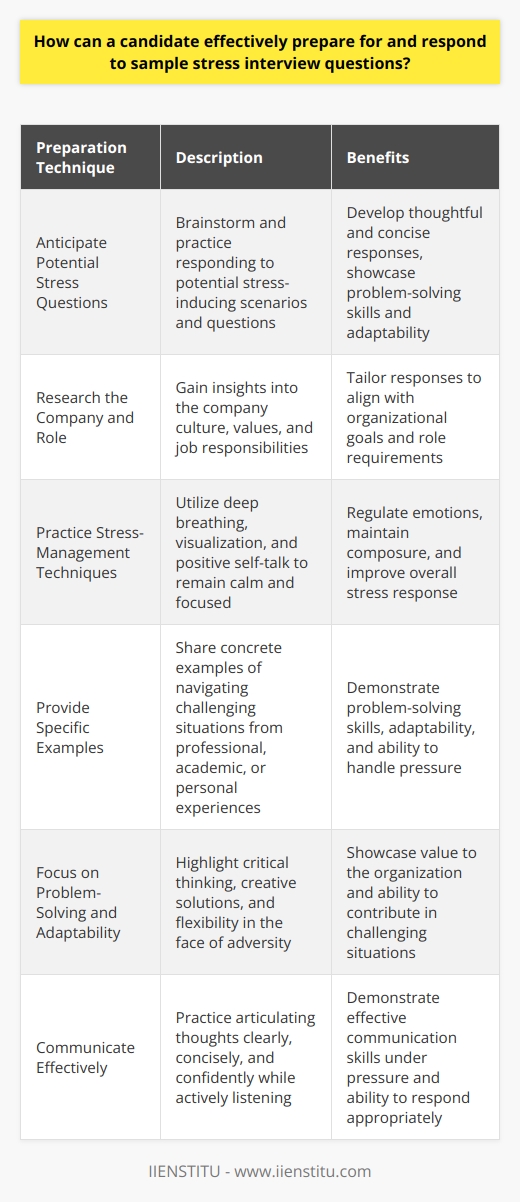
What strategies can be employed to maintain composure when faced with sample stress interview questions?
When confronted with sample stress interview questions, several strategies can be employed to maintain composure and provide effective responses. First and foremost, thorough preparation is essential to building confidence and reducing anxiety during the interview process. Researching common stress questions, practicing answers, and conducting mock interviews with friends or family can help individuals become more comfortable with the format and develop a clear, concise communication style.
Mindfulness and Relaxation Techniques
Engaging in mindfulness and relaxation techniques, such as deep breathing exercises or meditation, can help interviewees manage stress levels and maintain focus. By taking a few moments to center oneself before the interview, candidates can enter the conversation with a clearer mind and a more positive outlook. Additionally, practicing self-compassion and reframing negative thoughts can help individuals maintain a healthy perspective and avoid becoming overwhelmed by the pressure of the situation.
Active Listening and Thoughtful Responses
During the interview, it is crucial to practice active listening and provide thoughtful, well-structured responses. By paying close attention to the interviewer's questions and taking a moment to organize one's thoughts before speaking, candidates can demonstrate their ability to remain calm and articulate under pressure. It is also important to maintain a professional demeanor, using appropriate body language and tone of voice to convey confidence and competence.
Embracing the Challenge
Another effective strategy for managing stress during sample stress interview questions is to embrace the challenge as an opportunity for growth and self-reflection. By viewing the experience as a chance to showcase one's skills, knowledge, and adaptability, candidates can approach the interview with a more positive mindset and a greater sense of purpose. This shift in perspective can help reduce anxiety and enable individuals to perform at their best, even in high-pressure situations.
Seeking Support and Feedback
Finally, it is important to seek support and feedback from trusted mentors, colleagues, or career counselors throughout the interview preparation process. By sharing concerns, discussing strategies, and receiving constructive criticism, individuals can gain valuable insights and build the confidence needed to succeed in challenging interview scenarios. Remember, while sample stress interview questions can be intimidating, they also provide an opportunity to demonstrate one's resilience, adaptability, and potential as a valuable member of any team or organization.
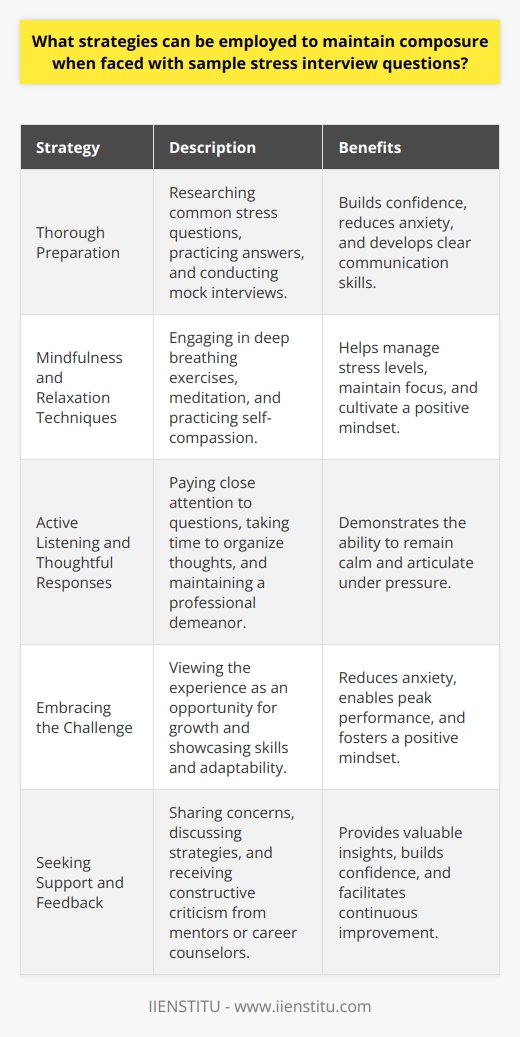
How do you manage stress and pressure in your professional life?
Managing stress and pressure in professional life is crucial for maintaining well-being and optimizing performance. Implementing effective strategies can help individuals cope with demanding situations and prevent burnout. One fundamental approach is to prioritize tasks and set realistic goals to avoid feeling overwhelmed. Breaking down larger projects into smaller, manageable steps can make them less daunting and more achievable.
Time Management Techniques
Employing time management techniques, such as the Pomodoro Technique or time-blocking, can enhance productivity and reduce stress. These methods involve dedicating specific time slots to different tasks and taking regular breaks to recharge. Creating a structured schedule helps maintain focus and minimizes procrastination, which can exacerbate stress levels.
Healthy Work-Life Balance
Establishing a healthy work-life balance is essential for managing stress and pressure. Setting clear boundaries between work and personal life allows individuals to disconnect and recharge. Engaging in hobbies, physical exercise, and social activities outside of work promotes mental well-being and reduces stress. Regular exercise releases endorphins, improves mood, and helps manage stress levels effectively.
Effective Communication and Support
Open communication with colleagues and supervisors is vital for managing stress in the workplace. Expressing concerns, seeking clarification, and asking for support when needed can alleviate pressure. Building a strong support network of trusted colleagues fosters a sense of camaraderie and provides opportunities for collaboration and problem-solving.
Mindfulness and Relaxation Techniques
Incorporating mindfulness and relaxation techniques into daily routines can significantly reduce stress and improve overall well-being. Practicing deep breathing exercises, meditation, or yoga helps calm the mind and body. These practices promote self-awareness, emotional regulation, and resilience in the face of challenges.
Professional Development and Growth
Engaging in continuous learning and professional development can boost confidence and reduce stress related to job performance. Acquiring new skills, attending workshops, and seeking mentorship opportunities enhance competence and adaptability. Embracing a growth mindset and viewing challenges as opportunities for learning and improvement can reframe stressful situations positively.
Remember, managing stress and pressure is an ongoing process that requires self-awareness and proactive effort. By implementing these strategies consistently, professionals can cultivate resilience, maintain well-being, and thrive in their careers.
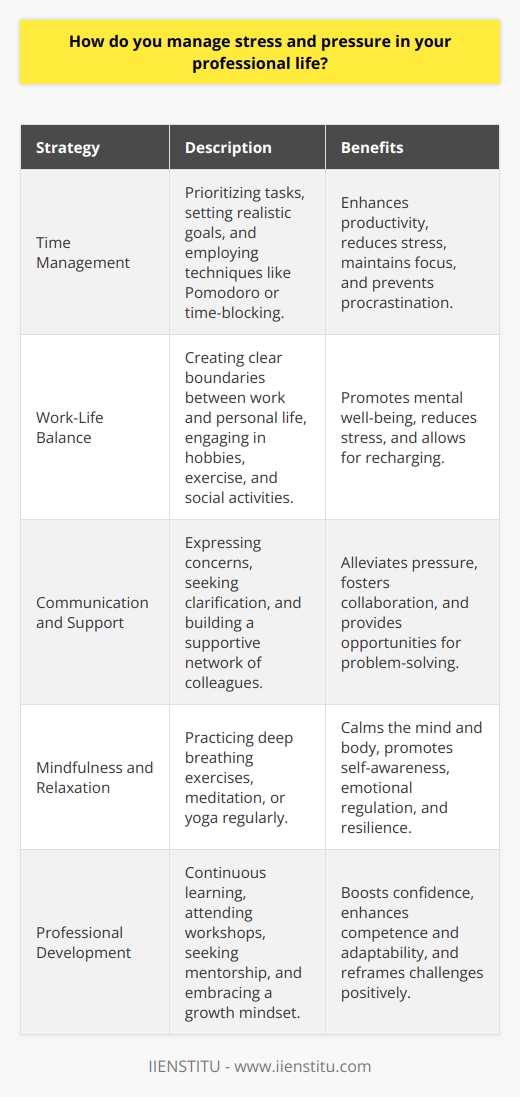
What strategies do you employ to cope with stress and pressure at work?
Coping with stress and pressure at work is crucial for maintaining well-being and productivity. Several strategies can help individuals manage these challenges effectively.
Prioritizing Tasks and Time Management
One of the most important strategies is to prioritize tasks and manage time efficiently. This involves identifying the most critical and time-sensitive tasks and focusing on them first. Breaking down larger projects into smaller, manageable steps can also help reduce feelings of being overwhelmed. Using tools like calendars, to-do lists, and project management software can assist in staying organized and on track.
Effective Communication and Boundary Setting
Clear communication with colleagues and supervisors is essential for managing stress and pressure at work. It is important to express concerns, ask for help when needed, and set realistic expectations. Setting boundaries is also crucial, such as learning to say no to extra tasks when already overloaded and ensuring a healthy work-life balance.
Practicing Mindfulness and Relaxation Techniques
Incorporating mindfulness and relaxation techniques into daily routines can help reduce stress and improve focus. This can include deep breathing exercises, meditation, or taking short breaks to stretch or walk. Regular physical exercise, such as yoga or jogging, can also help alleviate stress and boost overall well-being.
Seeking Support and Maintaining a Positive Outlook
Building a support network at work and in personal life is essential for coping with stress. This can involve reaching out to colleagues for advice, mentorship, or simply a listening ear. Engaging in hobbies and activities outside of work can also provide a sense of balance and perspective. Maintaining a positive outlook and practicing gratitude can help reframe challenges as opportunities for growth and learning.
Continuous Learning and Skill Development
Investing in personal and professional development can increase confidence and reduce stress related to job performance. This can include attending workshops, taking online courses, or seeking mentorship to improve skills and knowledge. Staying updated with industry trends and best practices can also help individuals feel more prepared and equipped to handle work-related challenges.
Conclusion
Coping with stress and pressure at work requires a multi-faceted approach that includes prioritizing tasks, effective communication, mindfulness, seeking support, and continuous learning. By implementing these strategies consistently, individuals can better manage stress, improve well-being, and enhance overall job satisfaction and performance.
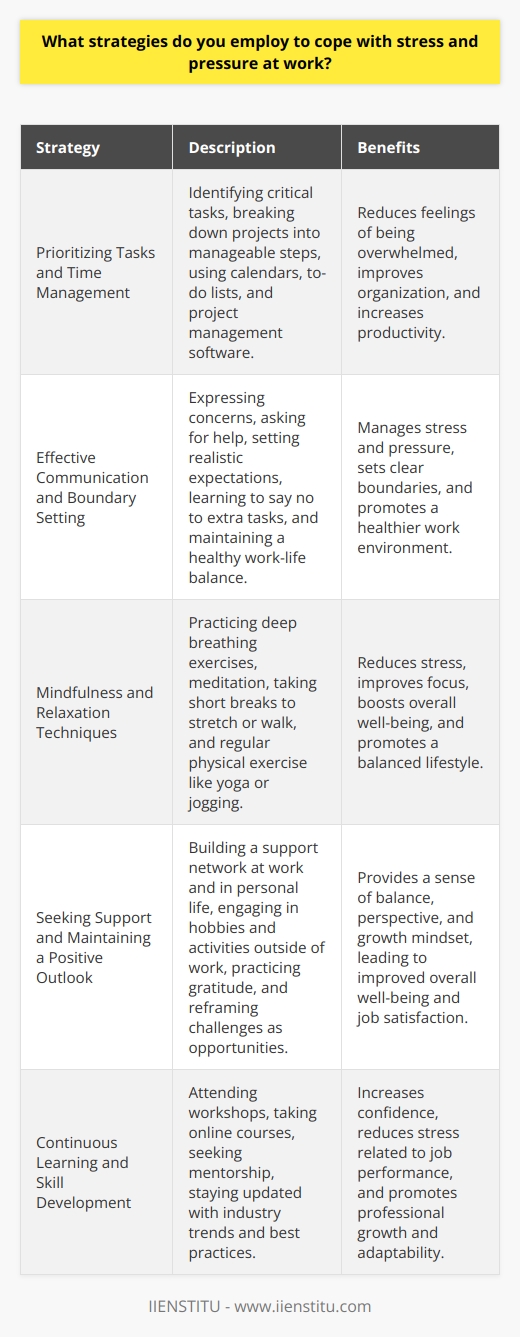
In what ways do you deal with stressful situations and pressure in your job?
Dealing with stressful situations and pressure in the workplace is a common challenge that many individuals face. Developing effective strategies to manage stress is crucial for maintaining productivity, well-being, and job satisfaction. This paragraph will explore various methods that can be employed to cope with stressful situations and pressure in the workplace.
Prioritizing Tasks and Time Management
One of the most effective ways to deal with stress and pressure at work is through prioritizing tasks. By identifying and focusing on the most critical and time-sensitive tasks, individuals can reduce feelings of being overwhelmed. Effective time management techniques, such as creating to-do lists and breaking large projects into smaller, manageable steps, can help alleviate stress and increase productivity.
Effective Communication and Support
Open and honest communication with colleagues and supervisors can be a valuable tool in managing stressful situations. Seeking support and guidance from team members or mentors can provide fresh perspectives and help in problem-solving. Additionally, clearly communicating concerns and challenges to supervisors can lead to collaborative solutions and a more supportive work environment.
Practicing Mindfulness and Relaxation Techniques
Incorporating mindfulness and relaxation techniques into daily routines can significantly reduce stress levels. Simple practices such as deep breathing exercises, meditation, or taking short breaks can help individuals maintain focus and calmness during high-pressure situations. Engaging in activities that promote physical and mental well-being, such as exercise or hobbies, can also serve as effective stress-relievers outside of work.
Setting Realistic Goals and Boundaries
Establishing realistic goals and expectations for oneself can help prevent feelings of being overwhelmed by workload. Setting clear boundaries between work and personal life is also essential for maintaining a healthy work-life balance. Learning to say "no" when necessary and avoiding taking on more than one can handle can reduce stress and prevent burnout.
Continuous Learning and Adaptability
Embracing continuous learning and adaptability can help individuals cope with the ever-changing demands of the workplace. Staying updated with industry trends, acquiring new skills, and being open to feedback can increase confidence and resilience in the face of stressful situations. Adopting a growth mindset and viewing challenges as opportunities for personal and professional development can also help reframe stressful experiences in a more positive light.
Seeking Professional Help
In cases where stress and pressure become overwhelming and affect an individual's well-being, seeking professional help is crucial. Many workplaces offer employee assistance programs that provide counseling and support services. Consulting with a mental health professional can help individuals develop personalized strategies for managing stress and building resilience in the face of challenging work situations.
In conclusion, dealing with stressful situations and pressure in the workplace requires a multifaceted approach. By prioritizing tasks, practicing effective communication, incorporating mindfulness and relaxation techniques, setting realistic goals and boundaries, embracing continuous learning, and seeking professional help when needed, individuals can successfully navigate the challenges of the modern workplace. Developing a toolkit of stress management strategies can lead to increased job satisfaction, improved performance, and overall well-being in both professional and personal life.
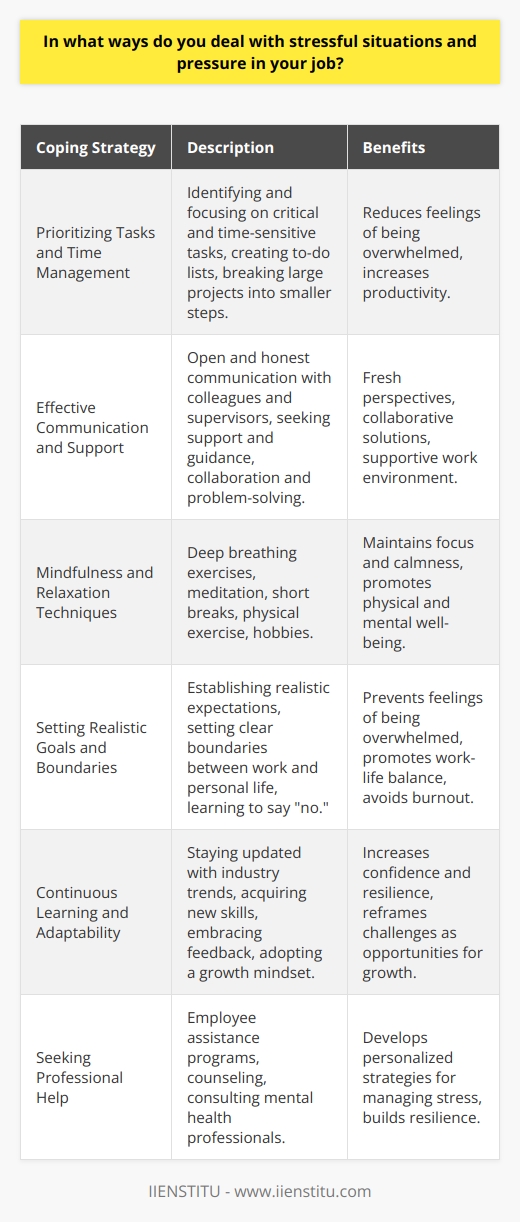
How do you handle stressful situations at work?
Handling stressful situations at work requires a combination of emotional intelligence, problem-solving skills, and effective communication. It is essential to remain calm and composed when faced with challenging circumstances. Taking a step back and assessing the situation objectively can help in identifying the root cause of the stress. Once the source of stress is identified, it is crucial to prioritize tasks and break them down into manageable chunks.
Developing Coping Mechanisms
Developing healthy coping mechanisms is vital in managing stress at work. Engaging in deep breathing exercises or brief meditation sessions can help in reducing anxiety and promoting relaxation. Regular physical exercise, such as taking a quick walk during lunch breaks, can also aid in relieving stress and improving overall well-being. It is important to find activities that help you unwind and recharge, whether it is listening to music, reading a book, or engaging in a hobby.
Communicating Effectively
Effective communication plays a crucial role in handling stressful situations at work. When faced with a challenging situation, it is essential to communicate openly and honestly with colleagues and supervisors. Expressing your concerns and seeking support can help in finding solutions and alleviating stress. Active listening and empathy are also key components of effective communication. By understanding the perspectives of others and finding common ground, conflicts can be resolved more efficiently.
Time Management and Prioritization
Effective time management and prioritization are crucial in reducing stress at work. Creating a to-do list and prioritizing tasks based on their importance and urgency can help in managing workload effectively. It is important to be realistic about what can be accomplished within a given timeframe and to avoid overcommitting. Learning to say no to non-essential tasks and delegating responsibilities when appropriate can also help in managing stress levels.
Maintaining Work-Life Balance
Maintaining a healthy work-life balance is essential in reducing stress and preventing burnout. Setting clear boundaries between work and personal life can help in ensuring that work-related stress does not spill over into other areas of life. Taking regular breaks throughout the day, using vacation time, and engaging in activities outside of work can help in promoting a sense of balance and reducing overall stress levels.
Seeking Support
Seeking support from colleagues, supervisors, or employee assistance programs can be beneficial in handling stressful situations at work. Building a strong support network can provide a sense of community and help in navigating challenging circumstances. It is important to remember that asking for help is not a sign of weakness but rather a proactive step towards managing stress and maintaining well-being.
In conclusion, handling stressful situations at work requires a multifaceted approach that includes developing coping mechanisms, communicating effectively, managing time and priorities, maintaining work-life balance, and seeking support when needed. By implementing these strategies, individuals can enhance their resilience and effectively navigate the challenges that arise in the workplace.
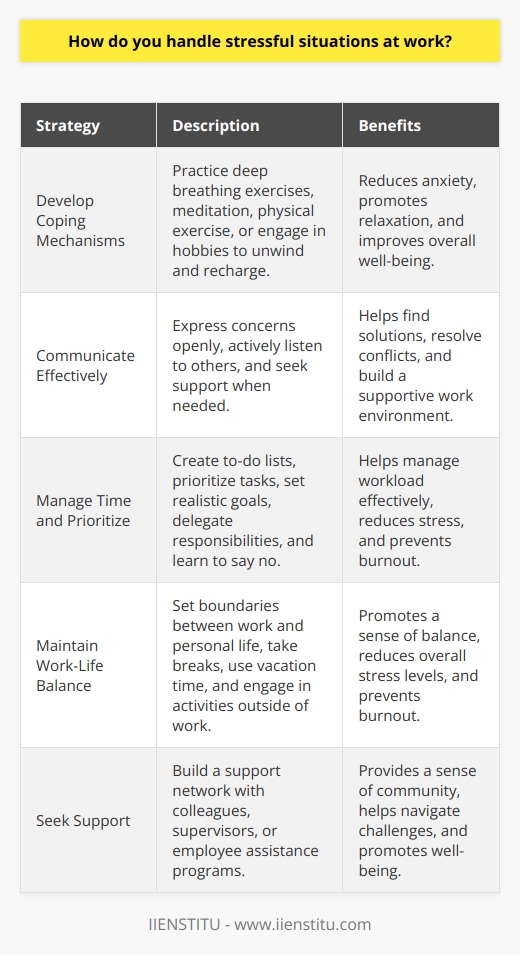
What are some effective strategies for managing stress in high-pressure environments?
Managing stress in high-pressure environments is crucial for maintaining productivity, well-being, and overall success. Several strategies can be employed to effectively cope with stress in such situations.
Prioritizing Tasks and Time Management
One of the most effective ways to manage stress is to prioritize tasks and manage time efficiently. By focusing on the most critical tasks first and breaking them down into smaller, manageable steps, individuals can reduce feelings of being overwhelmed. Utilizing time management techniques, such as the Pomodoro Technique or time-blocking, can help structure the day and ensure that important tasks are addressed in a timely manner.
Practicing Mindfulness and Relaxation Techniques
Incorporating mindfulness and relaxation techniques into daily routines can significantly reduce stress levels. Mindfulness involves being present in the moment and observing thoughts and emotions without judgment. This practice can help individuals maintain a sense of calm and perspective, even in high-pressure situations. Relaxation techniques, such as deep breathing exercises, progressive muscle relaxation, or guided imagery, can help alleviate physical tension and promote a sense of tranquility.
Establishing Boundaries and Communicating Effectively
Setting clear boundaries and communicating effectively are essential for managing stress in high-pressure environments. It is important to establish realistic expectations and communicate them clearly to colleagues, supervisors, or clients. Learning to say "no" to unreasonable demands or requests can help prevent taking on more than one can handle. Additionally, fostering open and honest communication channels can help address potential stressors before they escalate.
Maintaining a Healthy Lifestyle
Adopting a healthy lifestyle can contribute significantly to stress management. Regular exercise, even in short bursts, can help reduce stress hormones, improve mood, and boost energy levels. Eating a balanced diet rich in fruits, vegetables, and whole grains can provide the necessary nutrients to support both physical and mental well-being. Adequate sleep is also crucial for stress management, as it allows the body and mind to recharge and recover from daily pressures.
Building a Support Network
Having a strong support network can be invaluable in managing stress. Surrounding oneself with supportive friends, family members, or colleagues can provide a sense of belonging and offer opportunities to share concerns and receive encouragement. Engaging in social activities or hobbies outside of work can also help maintain a healthy work-life balance and provide a much-needed break from high-pressure environments.
Seeking Professional Help
When stress becomes overwhelming or begins to impact daily functioning, seeking professional help may be necessary. Consulting with a mental health professional, such as a therapist or counselor, can provide individuals with additional coping strategies and support tailored to their specific needs. Many organizations also offer employee assistance programs (EAPs) that provide confidential counseling services to help employees manage stress and maintain well-being.
By implementing these strategies, individuals can effectively manage stress in high-pressure environments. It is essential to remember that stress management is an ongoing process, and it may take time to find the techniques that work best for each individual. With consistent practice and self-care, it is possible to navigate high-pressure situations with greater ease and resilience.
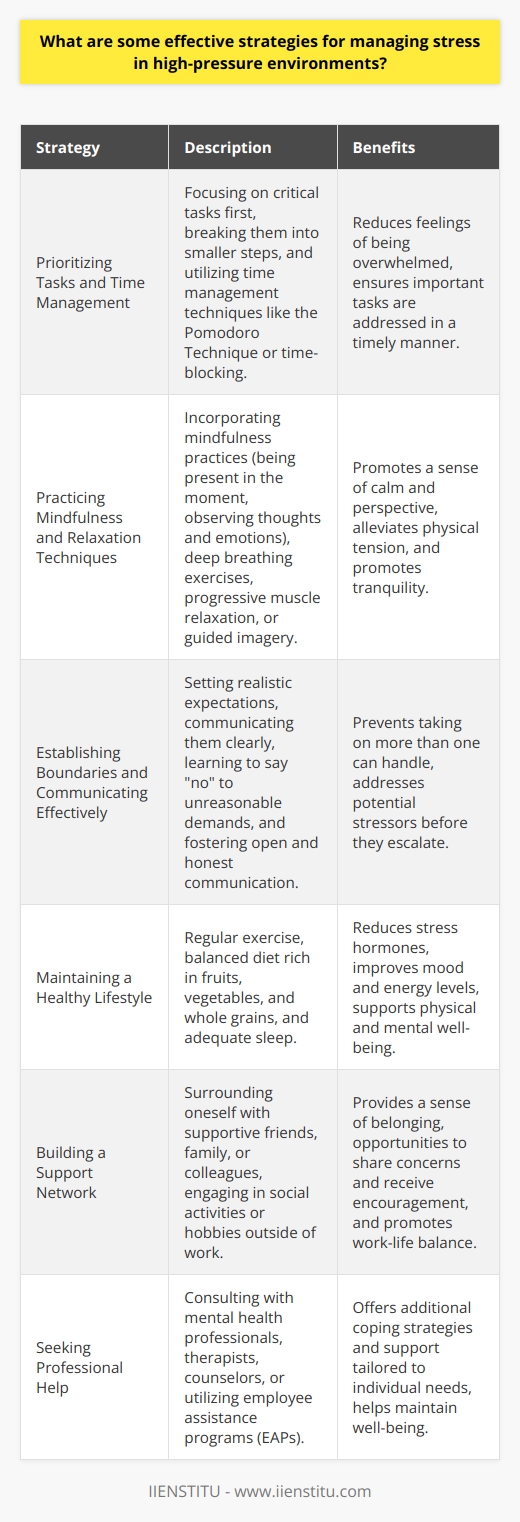
How can one maintain a positive outlook and cope with stress in challenging situations?
Maintaining a positive outlook and coping with stress in challenging situations is crucial for overall well-being. Adopting a proactive approach, practicing mindfulness, and seeking support can help individuals navigate difficult times effectively. By focusing on the present moment and engaging in regular self-care activities, one can reduce stress levels and maintain a balanced perspective.
Cultivate a Growth Mindset
Embracing a growth mindset is essential for maintaining positivity during challenging situations. Recognize that obstacles and setbacks are opportunities for learning and personal development. Reframe negative thoughts into positive ones, focusing on solutions rather than dwelling on problems. Celebrate small victories and acknowledge progress, no matter how minor it may seem.
Practice Mindfulness and Relaxation Techniques
Mindfulness and relaxation techniques are powerful tools for managing stress. Engage in deep breathing exercises, progressive muscle relaxation, or meditation to calm the mind and body. Take regular breaks throughout the day to disconnect from stressors and recharge. Incorporate activities that bring joy and relaxation, such as reading, listening to music, or spending time in nature.
Prioritize Self-Care
Self-care is crucial for maintaining a positive outlook during challenging times. Prioritize adequate sleep, a balanced diet, and regular exercise to support physical and mental well-being. Set boundaries and learn to say no to commitments that drain energy or cause unnecessary stress. Engage in hobbies and activities that provide a sense of fulfillment and purpose.
Build a Support System
Surround yourself with a supportive network of family, friends, and colleagues. Share your concerns and feelings with trusted individuals who can offer empathy, guidance, and encouragement. Seek professional help, such as counseling or therapy, if needed. Remember that asking for help is a sign of strength, not weakness.
Practice Gratitude
Cultivating gratitude can significantly shift one's perspective during challenging situations. Take time each day to reflect on the positive aspects of life, no matter how small they may seem. Keep a gratitude journal, expressing appreciation for the good things and the lessons learned from difficult experiences. Regularly acknowledge the kindness and support received from others.
Maintain a Balanced Perspective
Avoid catastrophizing or exaggerating the severity of a situation. Recognize that challenges are temporary and that this too shall pass. Focus on what can be controlled and let go of what cannot be changed. Maintain a realistic outlook, acknowledging that setbacks and obstacles are a normal part of life.
Engage in Problem-Solving
When faced with a challenging situation, adopt a proactive approach. Break down the problem into smaller, manageable steps. Brainstorm potential solutions and evaluate their feasibility. Seek advice or guidance from others who have faced similar challenges. Celebrate progress and learn from setbacks, using them as opportunities for growth and resilience.
By implementing these strategies, individuals can maintain a positive outlook and effectively cope with stress during challenging situations. Remember that building resilience is an ongoing process, and it is essential to be patient and kind to oneself. With practice and persistence, one can develop the skills necessary to navigate life's challenges with grace and optimism.
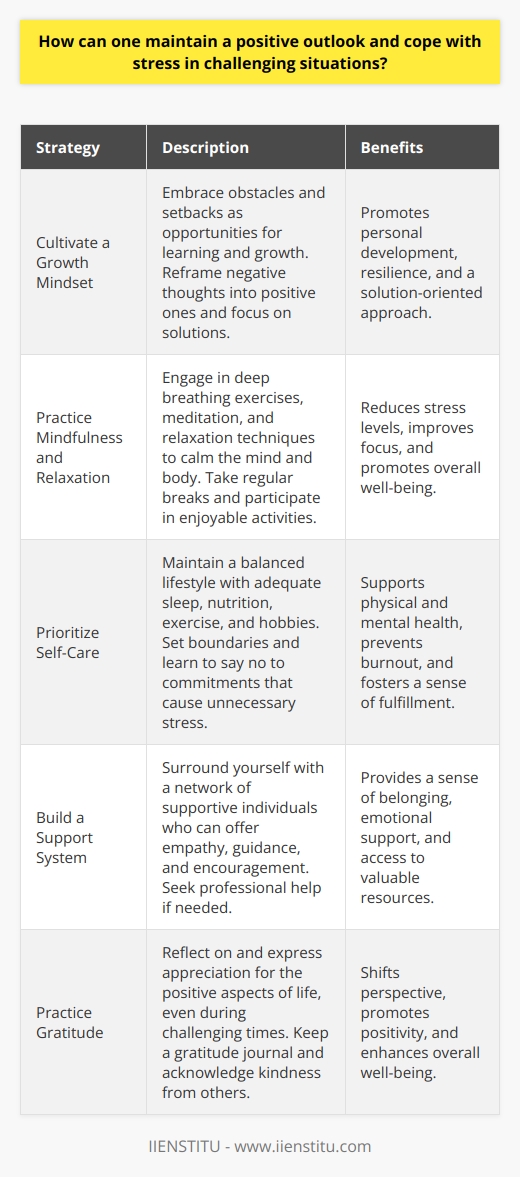
How do you handle stress and pressure as a fresher in a new job?
Starting a new job as a fresher can be an exciting yet stressful experience. It's normal to feel pressure to perform well and prove yourself in your new role. However, there are several strategies you can employ to manage stress and pressure effectively.
Develop a Positive Mindset
Cultivate a positive outlook towards your new job and challenges. View them as opportunities for growth and learning. Embrace a growth mindset and believe in your ability to adapt and improve. Positive self-talk and visualization techniques can help you maintain a constructive perspective.
Seek Clarity and Understanding
Ensure you have a clear understanding of your role, responsibilities, and expectations. Don't hesitate to ask questions and seek guidance from your supervisor or colleagues. Clarity will help you focus your efforts and reduce uncertainty-induced stress.
Set Realistic Goals and Prioritize
Break down your tasks into manageable goals and prioritize them based on importance and urgency. This approach will help you stay organized and avoid feeling overwhelmed. Celebrate small victories along the way to maintain motivation and a sense of accomplishment.
Communicate Effectively
Open and honest communication is crucial in managing stress and pressure. Keep your supervisor informed about your progress, challenges, and any support you need. Actively listen to feedback and be receptive to constructive criticism. Effective communication will foster a supportive work environment.
Practice Time Management
Develop strong time management skills to optimize your productivity and reduce stress. Use tools like calendars, to-do lists, and project management software to stay organized. Prioritize tasks, set realistic deadlines, and allocate sufficient time for each activity. Avoid procrastination and distractions to maintain focus.
Take Breaks and Practice Self-Care
Regular breaks are essential for recharging and maintaining mental well-being. Step away from your desk, stretch, or engage in brief relaxation exercises. Prioritize self-care activities outside of work, such as exercise, hobbies, and spending time with loved ones. Adequate sleep, a balanced diet, and stress-relief techniques like deep breathing or meditation can help you manage pressure.
Build a Support Network
Cultivate positive relationships with your colleagues and seek out mentors within the organization. A supportive network can provide guidance, encouragement, and a sounding board for your concerns. Don't hesitate to reach out for help when needed.
Embrace Learning and Growth
Approach your new job as a learning opportunity. Engage in training, workshops, and professional development activities to enhance your skills and knowledge. Continuous learning will boost your confidence and help you adapt to new challenges more effectively.
Maintain Work-Life Balance
Set clear boundaries between your work and personal life to avoid burnout. Disconnect from work-related tasks and communications outside of designated hours. Engage in activities that bring you joy and help you relax. A healthy work-life balance is crucial for long-term stress management.
Remember, it's normal to experience stress and pressure as a fresher in a new job. Be patient with yourself and acknowledge that it takes time to adapt and grow. By implementing these strategies consistently, you can effectively manage stress, excel in your role, and lay the foundation for a successful career.

What strategies can freshers employ to cope with stress and pressure in the workplace?
Freshers entering the workforce often face significant stress and pressure as they adapt to their new roles and responsibilities. Developing effective strategies to manage these challenges is crucial for maintaining well-being and performing at their best. One key approach is to prioritize self-care, including regular exercise, sufficient sleep, and a balanced diet. Building a strong support network of colleagues, mentors, and friends can also provide valuable guidance and emotional support. Effective time management is another essential skill, involving breaking tasks into manageable steps and setting realistic goals. Communicating openly with supervisors and colleagues can help clarify expectations and address concerns promptly. Seeking opportunities for professional development, such as training programs or workshops, can boost confidence and skills. Ultimately, by proactively implementing these strategies, freshers can successfully navigate the demands of the workplace and thrive in their careers.
Prioritize Self-Care
Self-care is a critical component of managing stress and pressure in the workplace. Engage in regular physical exercise to boost endorphins and reduce tension. Ensure you get enough sleep each night to recharge and maintain focus. Eat a balanced diet rich in fruits, vegetables, and whole grains to support overall health. Make time for relaxation techniques like deep breathing, meditation, or yoga to calm the mind. Remember, taking care of yourself is not a luxury but a necessity for long-term success.
Build a Strong Support Network
Surrounding yourself with a supportive network can make a significant difference in navigating workplace challenges. Develop positive relationships with colleagues who can offer advice, encouragement, and a listening ear. Seek out mentors within your organization who can provide guidance and share their experiences. Maintain connections with friends and family outside of work for a well-rounded support system. Don't hesitate to reach out for help when needed; everyone faces difficulties at some point.
Develop Time Management Skills
Effective time management is key to reducing stress and increasing productivity. Break large projects into smaller, manageable tasks to avoid feeling overwhelmed. Set realistic deadlines for yourself and communicate them clearly with your team. Use tools like calendars, to-do lists, or productivity apps to stay organized and on track. Prioritize tasks based on importance and urgency, focusing on high-value activities first. Learn to delegate when appropriate and say no to non-essential requests to maintain a healthy workload.
Communicate Openly and Honestly
Open communication is essential for building trust and resolving issues in the workplace. Discuss your goals, expectations, and any challenges you face with your supervisor regularly. Seek clarification when needed to ensure you understand your responsibilities and performance metrics. Be proactive in addressing conflicts or misunderstandings with colleagues, focusing on finding solutions rather than placing blame. Offer constructive feedback and be open to receiving it in return, viewing it as an opportunity for growth.
Embrace Professional Development
Engaging in continuous learning and professional development can boost your confidence and help you adapt to new challenges. Seek out training programs, workshops, or conferences that align with your career goals. Take advantage of any mentorship or coaching opportunities offered by your organization. Stay updated on industry trends and best practices through reading, attending webinars, or joining professional associations. By actively investing in your own growth, you'll be better equipped to handle the demands of your role.
Practice Mindfulness and Gratitude
Incorporating mindfulness and gratitude into your daily routine can help maintain perspective and reduce stress. Take a few minutes each day to focus on the present moment, letting go of worries about the past or future. Practice gratitude by reflecting on the positive aspects of your job and life, no matter how small. Celebrate your accomplishments and learn from your mistakes without dwelling on them. By cultivating a mindful and appreciative mindset, you'll be better able to navigate the ups and downs of your career journey.
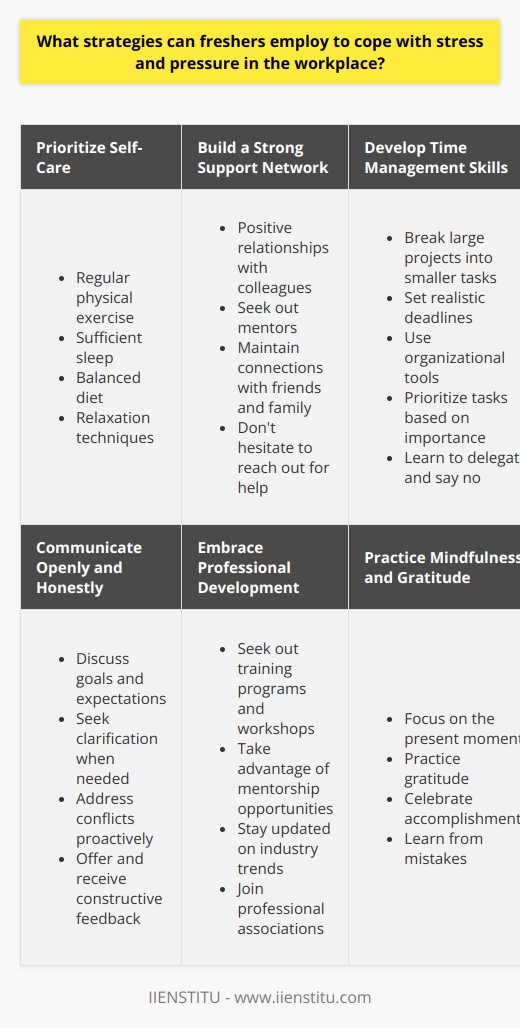
How can freshers effectively manage stress and pressure when starting their careers?
Starting a new career can be an exciting yet challenging experience for freshers, as they navigate unfamiliar responsibilities and expectations. Stress and pressure are common consequences of this transition, but there are several strategies freshers can employ to effectively manage these feelings and thrive in their new roles.
Develop a Support System
Freshers should prioritize building relationships with colleagues, mentors, and friends who can offer guidance and support. Sharing experiences and challenges with others can provide valuable perspective and reduce feelings of isolation. Seeking advice from experienced professionals can also help freshers navigate complex situations and make informed decisions.
Practice Time Management
Effective time management is crucial for managing stress and pressure in the workplace. Freshers should create realistic schedules, prioritize tasks, and break larger projects into smaller, manageable steps. Setting clear boundaries between work and personal life can also help maintain a healthy work-life balance and prevent burnout.
Utilize Stress-Reduction Techniques
Incorporating stress-reduction techniques into daily routines can help freshers manage pressure and maintain mental well-being. Regular exercise, meditation, deep breathing, and engaging in hobbies can provide much-needed breaks from work-related stress. Freshers should also prioritize self-care activities, such as getting enough sleep, eating a balanced diet, and staying hydrated.
Communicate Openly and Honestly
Open and honest communication with supervisors and colleagues is essential for managing stress and pressure. Freshers should feel comfortable asking for help, clarification, or feedback when needed. Regularly discussing goals, expectations, and challenges with supervisors can help freshers stay on track and receive necessary support.
Embrace a Growth Mindset
Adopting a growth mindset can help freshers view challenges as opportunities for learning and development. Instead of becoming overwhelmed by setbacks or mistakes, freshers should focus on the lessons learned and use them to improve future performance. Celebrating small victories and acknowledging progress can also boost confidence and motivation.
Seek Professional Help if Needed
If stress and pressure become overwhelming, freshers should not hesitate to seek professional help. Many organizations offer employee assistance programs that provide confidential counseling and support services. Talking to a therapist or counselor can help freshers develop coping strategies and maintain mental health.
By implementing these strategies, freshers can effectively manage stress and pressure as they embark on their new careers. Remember, it is normal to experience challenges and setbacks, but with the right tools and support, freshers can thrive and achieve their professional goals.
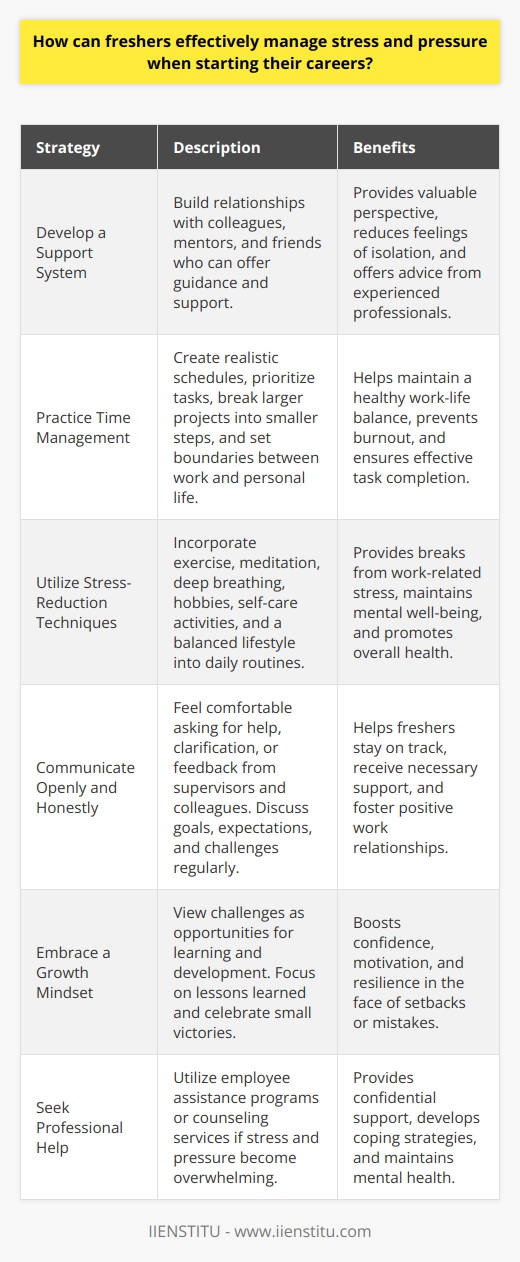
How do you assist your colleagues in coping with stress?
Assisting colleagues in coping with stress is crucial for maintaining a healthy and productive work environment. There are several strategies that can be employed to help coworkers manage stress effectively. One approach is to foster open communication and encourage colleagues to share their concerns and challenges. By creating a supportive and non-judgmental atmosphere, individuals feel more comfortable discussing their stressors and seeking help when needed.
Promoting Work-Life Balance
Another way to assist colleagues in coping with stress is to promote work-life balance. Encouraging regular breaks, setting realistic deadlines, and respecting personal time can help reduce the pressure and prevent burnout. It's important to lead by example and demonstrate the importance of self-care and boundary-setting. Offering flexible work arrangements, such as remote work options or adjustable schedules, can also alleviate stress by allowing colleagues to better manage their personal and professional responsibilities.
Organizing Stress-Reducing Activities
Organizing stress-reducing activities in the workplace can be an effective way to help colleagues cope with stress. This can include arranging yoga or meditation sessions, providing access to a quiet relaxation space, or organizing team-building exercises that promote collaboration and positive interactions. Encouraging physical activity, such as walking meetings or fitness challenges, can also help reduce stress and improve overall well-being.
Providing Resources and Support
Ensuring that colleagues have access to resources and support is crucial in helping them cope with stress. This may involve providing information about employee assistance programs, mental health services, or stress management workshops. Offering training on time management, effective communication, and conflict resolution can also equip colleagues with the skills needed to navigate stressful situations. Additionally, fostering a culture of recognition and appreciation can boost morale and reduce stress by acknowledging the efforts and contributions of team members.
Leading by Example
As a leader or colleague, it's important to model healthy stress management behaviors. This includes maintaining a positive attitude, practicing self-care, and setting realistic expectations for oneself and others. By demonstrating effective stress-coping strategies and prioritizing mental well-being, you can inspire and support your colleagues in managing their own stress levels.
In conclusion, assisting colleagues in coping with stress requires a multifaceted approach that combines open communication, work-life balance, stress-reducing activities, resources and support, and leading by example. By fostering a supportive and proactive work environment, we can help our colleagues navigate the challenges of stress and maintain their overall well-being and productivity.
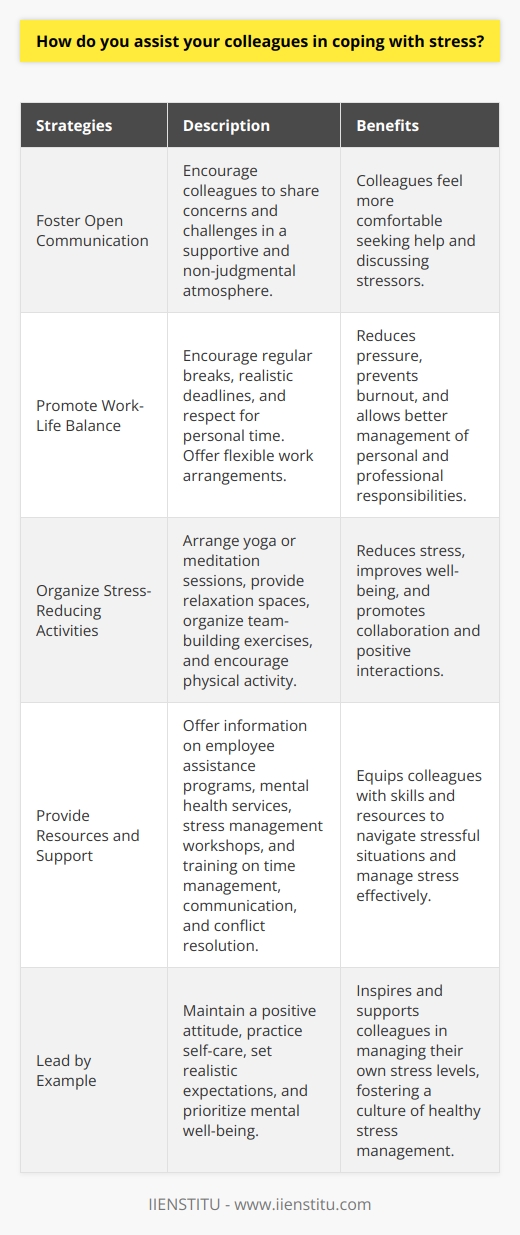
What strategies do you employ to help your peers manage stress effectively?
Effective stress management is crucial for maintaining mental well-being and optimal performance in academic and professional settings. To help my peers manage stress effectively, I employ several strategies that have proven beneficial. These strategies include promoting open communication, encouraging regular exercise, emphasizing the importance of time management, and fostering a supportive environment.
Promoting Open Communication
One of the key strategies I use to help my peers manage stress is promoting open communication. I encourage my peers to share their concerns, anxieties, and challenges openly. By creating a safe space for dialogue, individuals can express their feelings and gain support from others. This open communication helps in identifying stressors and collectively brainstorming solutions to mitigate their impact.
Encouraging Regular Exercise
Exercise is a powerful tool for managing stress, and I actively encourage my peers to engage in regular physical activity. Whether it's going for a jog, practicing yoga, or participating in team sports, exercise releases endorphins, reduces tension, and improves overall mood. I often organize group fitness activities or share information about campus recreation facilities to make exercise more accessible and enjoyable for my peers.
Benefits of Exercise for Stress Management
Releases endorphins, which are natural mood elevators
Reduces muscle tension and promotes relaxation
Improves sleep quality, which is essential for stress management
Boosts self-confidence and self-esteem
Emphasizing Time Management
Effective time management is crucial for reducing stress levels. I encourage my peers to prioritize tasks, set realistic goals, and create a balanced schedule. By breaking down larger tasks into smaller, manageable steps, individuals can avoid feeling overwhelmed. I also suggest using time management tools like calendars, to-do lists, and productivity apps to stay organized and on track.
Time Management Techniques
Prioritizing tasks based on importance and urgency
Setting realistic goals and deadlines
Breaking down large tasks into smaller, manageable steps
Using calendars and to-do lists to stay organized
Minimizing distractions and procrastination
Fostering a Supportive Environment
Creating a supportive environment is essential for helping peers manage stress. I strive to foster a culture of empathy, understanding, and mutual support within my peer group. By actively listening to others, offering words of encouragement, and providing practical assistance when needed, we can create a strong support system. Engaging in group activities, study sessions, or social events can also help build a sense of community and reduce feelings of isolation.
Ways to Foster a Supportive Environment
Practice active listening and validate others' feelings
Offer words of encouragement and reassurance
Provide practical assistance when needed
Organize group activities and social events to build a sense of community
Promote a culture of empathy and understanding
By implementing these strategies and leading by example, I aim to empower my peers with the tools and support they need to effectively manage stress. Through open communication, regular exercise, effective time management, and a supportive environment, we can foster a culture of wellness and resilience within our peer group.
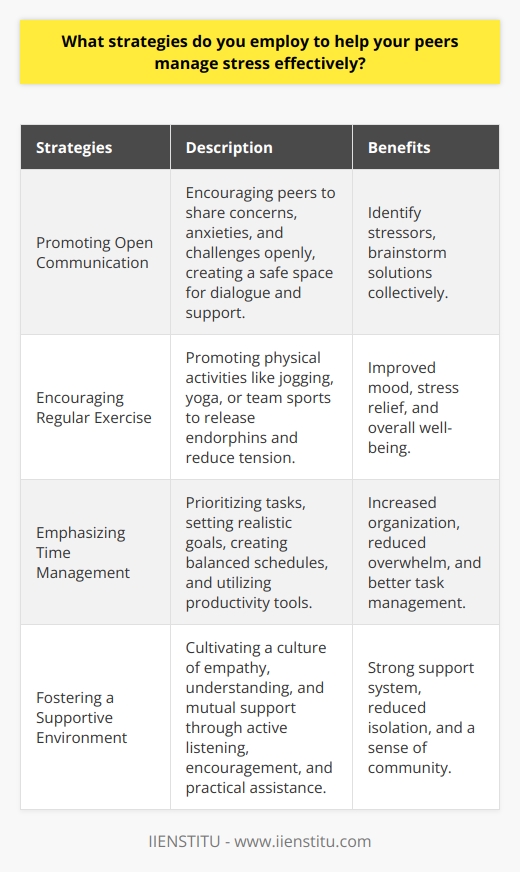
In what ways do you support your coworkers in dealing with stressful situations?
Supporting coworkers during stressful situations is crucial for maintaining a healthy and productive work environment. One effective way to provide support is through active listening. By giving coworkers your undivided attention and allowing them to express their concerns, you demonstrate empathy and understanding. Offering a non-judgmental ear can help alleviate their stress and make them feel valued.
Promoting Open Communication
Encouraging open communication among team members is another way to support coworkers during stressful times. Create a safe space where individuals feel comfortable sharing their struggles and seeking help. Regular check-ins, either through one-on-one meetings or team discussions, provide opportunities for coworkers to voice their concerns and brainstorm solutions together. By fostering a culture of transparency and trust, you create a supportive network within the workplace.
Offering Practical Assistance
In addition to emotional support, offering practical assistance can greatly help coworkers manage stressful situations. This may involve taking on extra tasks to lighten their workload or providing guidance and resources to help them navigate challenges. Collaborating with coworkers to break down complex projects into manageable steps can make overwhelming situations feel more achievable. By extending a helping hand, you show that you are invested in your coworkers' well-being and success.
Promoting Self-Care and Stress Management
Encouraging coworkers to prioritize self-care is essential for managing stress in the long run. Share stress management techniques, such as deep breathing exercises, meditation, or regular breaks, to help them cope with high-pressure situations. Lead by example by maintaining a healthy work-life balance and setting boundaries when necessary. Organizing team-building activities or social events can also provide opportunities for coworkers to unwind and build stronger relationships, fostering a more supportive work environment.
Recognizing and Celebrating Achievements
Acknowledging and celebrating coworkers' achievements, both big and small, can be a powerful way to boost morale during stressful times. Regularly express appreciation for their hard work and contributions, either through verbal praise or written acknowledgments. Highlighting their successes reminds them of their capabilities and helps build confidence in their ability to overcome challenges. By creating a positive and supportive atmosphere, you contribute to reducing overall stress levels within the team.
Seeking Professional Help When Needed
Sometimes, despite your best efforts, a coworker may require professional support to deal with stress effectively. Be aware of signs that indicate a colleague might be struggling, such as changes in behavior or performance. If you suspect that a coworker is experiencing significant stress or mental health issues, encourage them to seek help from a qualified professional, such as a therapist or counselor. Many organizations offer employee assistance programs (EAPs) that provide confidential counseling services to support employees' well-being.
By actively listening, promoting open communication, offering practical assistance, encouraging self-care, recognizing achievements, and guiding coworkers towards professional help when needed, you can significantly contribute to creating a supportive and resilient work environment. Remember, supporting your coworkers during stressful situations not only benefits them individually but also strengthens the overall team dynamic and enhances productivity in the long run.
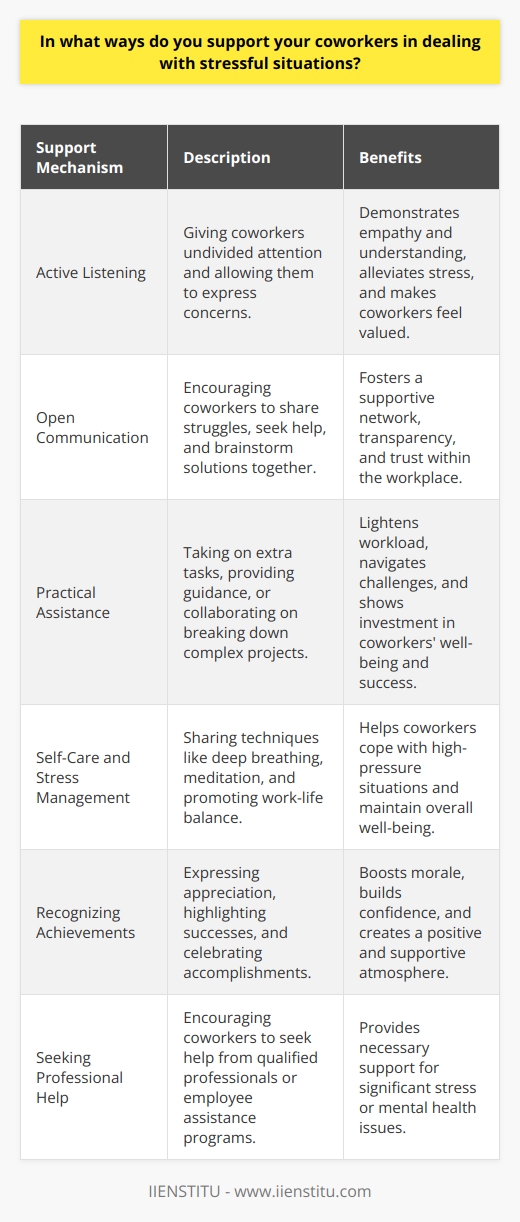
How do you help your peers manage stress in a healthy and productive manner?
Helping peers manage stress in a healthy and productive manner is crucial for their overall well-being and success. There are several strategies one can employ to support their peers in dealing with stress effectively.
Encourage Open Communication
Creating a safe and non-judgmental environment where peers feel comfortable sharing their concerns is essential. Actively listen to their problems and offer empathy and understanding. Validate their feelings and experiences, and reassure them that seeking help is a sign of strength.
Promote Healthy Coping Mechanisms
Encourage your peers to adopt healthy coping strategies to manage stress. These may include regular exercise, mindfulness practices like meditation or deep breathing, and engaging in hobbies or activities they enjoy. Share resources such as stress management workshops, online courses, or self-help books that you have found beneficial.
Emphasize the Importance of Self-Care
Remind your peers to prioritize self-care activities that promote physical, mental, and emotional well-being. This includes maintaining a balanced diet, getting adequate sleep, and setting aside time for relaxation and leisure activities. Encourage them to establish healthy boundaries and learn to say no when necessary to avoid overcommitting themselves.
Foster a Supportive Network
Help your peers build a strong support system by connecting them with others who may be going through similar experiences. Introduce them to support groups, clubs, or organizations that align with their interests and needs. Organize study groups or social activities that provide opportunities for peer interaction and collaboration, fostering a sense of belonging and reducing feelings of isolation.
Recommend Professional Help When Needed
Recognize when a peer's stress levels are becoming overwhelming and their coping mechanisms are no longer effective. In such cases, encourage them to seek professional help from a counselor, therapist, or mental health specialist. Provide information about available resources on campus or in the community, such as counseling centers or helplines.
Lead by Example
Model healthy stress management techniques in your own life. Share your personal experiences and strategies for coping with stress, demonstrating that it is possible to manage challenges effectively. Maintain a positive attitude and approach problems with resilience and adaptability.
Organize Stress-Relief Activities
Plan and implement stress-relief activities or events that promote relaxation and fun. These could include group exercise sessions, art therapy workshops, or outdoor adventures. Encourage participation and create a sense of camaraderie among peers, fostering a supportive and stress-free environment.
By implementing these strategies, you can play a significant role in helping your peers manage stress in a healthy and productive manner. Remember, everyone deals with stress differently, so be patient, understanding, and flexible in your approach. Together, you can create a supportive community that promotes well-being and success for all.
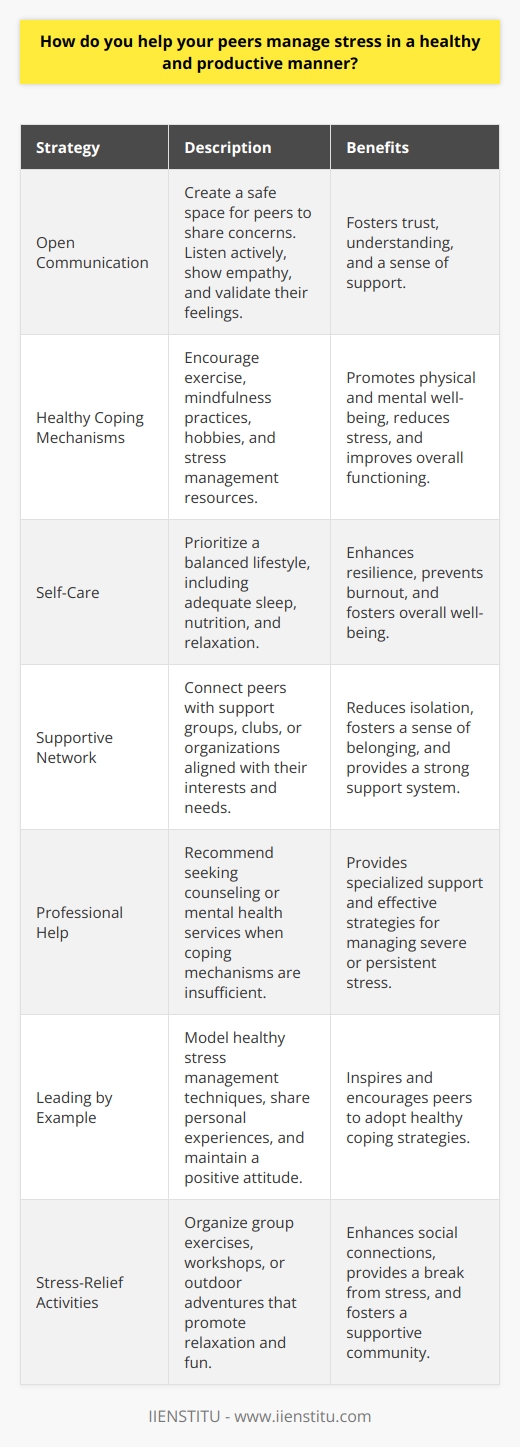
What strategies do you recommend to your colleagues for effectively coping with stress?
Stress is an inevitable part of life, especially in the workplace. Developing effective coping strategies is crucial for maintaining mental well-being and productivity. Here are some strategies I recommend to my colleagues for managing stress.
Prioritize Self-Care
Engaging in regular self-care activities is essential for reducing stress levels. This includes getting enough sleep, eating a balanced diet, and exercising regularly. Taking breaks throughout the day to stretch, meditate, or practice deep breathing can also help alleviate stress.
Set Realistic Goals
Setting achievable goals can help prevent feelings of overwhelm and stress. Break large projects into smaller, manageable tasks. Celebrate small victories along the way to maintain motivation and a sense of accomplishment.
Practice Time Management
Effective time management is key to reducing stress in the workplace. Prioritize tasks based on importance and urgency. Use tools like calendars, to-do lists, and productivity apps to stay organized and on track.
Learn to Say No
Taking on too many responsibilities can quickly lead to burnout. It's important to set boundaries and learn to say no when necessary. Communicate your limits clearly and respectfully to colleagues and supervisors.
Seek Support
Don't hesitate to reach out for support when feeling overwhelmed. Talk to a trusted colleague, friend, or family member about your stress. Consider seeking professional help from a therapist or counselor if needed.
Practice Mindfulness
Mindfulness techniques, such as meditation and deep breathing, can help reduce stress and improve focus. Take a few minutes each day to practice mindfulness. Apps like Headspace and Calm offer guided meditations for beginners.
Maintain Work-Life Balance
Creating a healthy work-life balance is crucial for managing stress. Set clear boundaries between work and personal time. Engage in hobbies and activities that bring you joy outside of work. Make time for relaxation and social connections.
Develop Resilience
Building resilience can help you better cope with stress and challenges. Cultivate a growth mindset by viewing obstacles as opportunities for learning and growth. Practice self-compassion and avoid negative self-talk.
Foster a Positive Work Environment
A supportive and positive work environment can greatly reduce stress levels. Encourage open communication, collaboration, and mutual respect among colleagues. Celebrate successes and milestones together as a team.
Embrace Flexibility
Be open to adapting to change and embracing flexibility in the workplace. Recognize that plans may shift and unexpected challenges may arise. Develop a flexible mindset and be willing to adjust your approach as needed.
Remember, managing stress is an ongoing process. Experiment with different strategies to find what works best for you. By prioritizing self-care, setting boundaries, and seeking support when needed, you can effectively cope with stress and maintain optimal well-being in the workplace.

In what ways do you support your coworkers in managing their stress levels?
Supporting coworkers in managing their stress levels is crucial for maintaining a healthy and productive work environment. One effective way to help colleagues cope with stress is by fostering open communication and creating a safe space for them to express their concerns and feelings. Actively listening to their problems and offering empathy can make a significant difference in reducing their stress levels. Additionally, promoting a culture of collaboration and teamwork can alleviate individual workloads and prevent burnout.
Encouraging Work-Life Balance
Another way to support coworkers in managing stress is by encouraging a healthy work-life balance. This can be achieved by respecting their personal time and boundaries, avoiding unnecessary after-hours communication, and ensuring that workloads are distributed fairly. Promoting the use of vacation days and encouraging regular breaks throughout the workday can also help reduce stress levels. By modeling a balanced lifestyle and prioritizing self-care, you can inspire your colleagues to do the same.
Organizing Stress-Relief Activities
Organizing stress-relief activities within the workplace can be an effective way to support coworkers in managing stress. This can include initiatives such as team-building exercises, mindfulness sessions, or even simple stretching breaks. Encouraging participation in these activities can help create a sense of camaraderie and provide a much-needed break from work-related pressures. Additionally, promoting physical activity and healthy habits, such as taking walks during lunch breaks, can contribute to overall stress reduction.
Providing Resources and Support
Offering resources and support to coworkers is another crucial aspect of helping them manage stress. This can involve sharing information about available employee assistance programs, mental health services, or stress management workshops. By being knowledgeable about these resources and actively promoting their use, you can help your colleagues access the support they need. Furthermore, creating a culture of openness and destigmatizing conversations about mental health can encourage coworkers to seek help when needed.
Leading by Example
Finally, one of the most powerful ways to support coworkers in managing stress is by leading by example. As a leader or a colleague, demonstrating effective stress management techniques and maintaining a positive attitude can have a ripple effect on the entire team. By prioritizing your own well-being and showcasing healthy coping mechanisms, you can inspire others to adopt similar practices. Regularly checking in with your coworkers, offering words of encouragement, and celebrating their successes can also contribute to a more supportive and stress-free work environment.
In conclusion, supporting coworkers in managing their stress levels requires a multifaceted approach that includes fostering open communication, encouraging work-life balance, organizing stress-relief activities, providing resources and support, and leading by example. By implementing these strategies and creating a culture of empathy and understanding, you can help your colleagues navigate the challenges of the workplace and maintain their overall well-being.
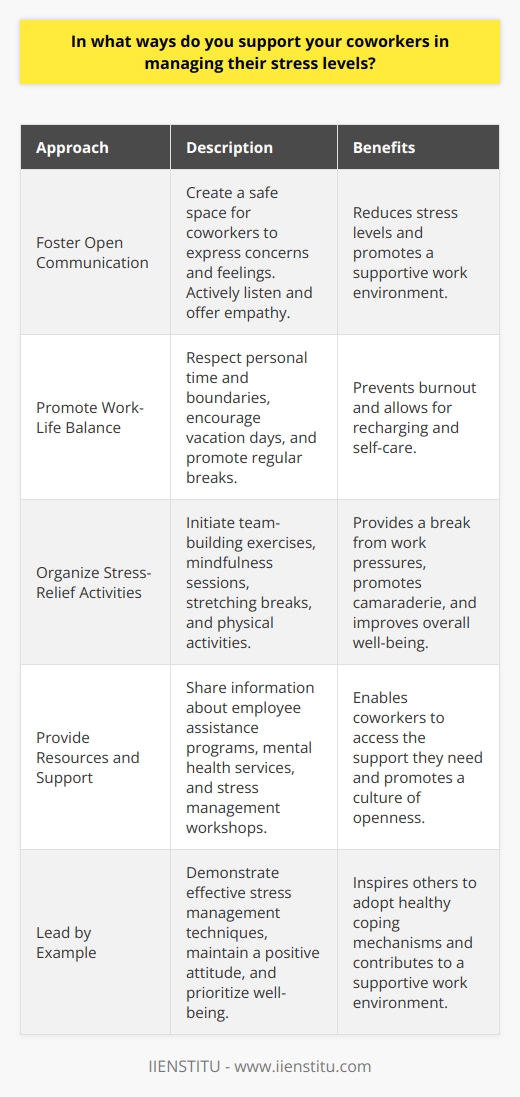
How do you typically handle stress and pressure in the workplace?
Handling stress and pressure in the workplace is crucial for maintaining productivity and well-being. There are several strategies that individuals can employ to effectively manage stress and thrive in high-pressure environments.
Prioritizing Tasks and Time Management
One of the most effective ways to handle stress in the workplace is through proper prioritization and time management. By identifying and focusing on the most critical tasks, individuals can ensure that they are making progress on important projects while minimizing the stress associated with less urgent responsibilities. Utilizing time management techniques, such as the Eisenhower Matrix or the Pomodoro Technique, can help individuals structure their workday and maintain a sense of control over their tasks.
Effective Communication and Delegation
Clear communication is essential for managing stress in the workplace. By openly discussing challenges and expectations with colleagues and supervisors, individuals can avoid misunderstandings and ensure that everyone is working towards common goals. Additionally, delegating tasks to team members when appropriate can help distribute the workload and reduce individual stress levels.
Seeking Support and Collaboration
Collaborating with colleagues and seeking support when needed can greatly alleviate stress in the workplace. Building strong professional relationships and fostering a supportive work environment can provide a sense of camaraderie and shared responsibility. Engaging in regular check-ins with team members and supervisors can help identify potential stressors and develop strategies to address them.
Maintaining Work-Life Balance
Achieving a healthy work-life balance is crucial for managing stress and preventing burnout. Setting clear boundaries between work and personal life, such as establishing specific work hours and avoiding work-related activities during off-hours, can help individuals recharge and maintain a sense of well-being. Engaging in hobbies, exercise, and relaxation techniques outside of work can also provide a much-needed break from professional pressures.
Practicing Mindfulness and Stress-Reduction Techniques
Incorporating mindfulness and stress-reduction techniques into daily routines can be highly effective in managing workplace stress. Practices such as deep breathing exercises, meditation, or yoga can help individuals stay grounded and focused, even in high-pressure situations. Taking short breaks throughout the day to stretch, walk, or engage in relaxation exercises can also help alleviate stress and improve overall well-being.
Developing Resilience and Adaptability
Building resilience and adaptability is essential for handling stress and pressure in the workplace. Embracing challenges as opportunities for growth and learning can help individuals maintain a positive mindset and cope with adversity. Cultivating a growth mindset, where setbacks are viewed as temporary and learning experiences, can foster resilience and enable individuals to bounce back from stressful situations more effectively.
In conclusion, handling stress and pressure in the workplace requires a multifaceted approach that includes effective time management, communication, collaboration, work-life balance, mindfulness, and resilience. By implementing these strategies and developing a proactive approach to stress management, individuals can thrive in high-pressure work environments while maintaining their well-being and productivity.

What strategies have you found effective in managing stress during high-pressure situations?
Managing stress during high-pressure situations is crucial for maintaining performance and well-being. Several strategies have proven effective in helping individuals cope with stress in demanding circumstances. One key approach is to practice mindfulness and relaxation techniques, such as deep breathing exercises or meditation. These practices help to calm the mind, reduce anxiety, and improve focus, allowing for better decision-making and problem-solving in stressful situations.
Prioritization and Time Management
Another important strategy is to prioritize tasks and manage time effectively. By breaking down complex problems into smaller, manageable steps, individuals can avoid feeling overwhelmed and maintain a sense of control. It is also essential to set realistic goals and expectations, as trying to achieve too much in a short period can lead to increased stress and burnout.
Social Support and Communication
Seeking social support from colleagues, friends, or family members can provide a valuable outlet for stress relief. Sharing concerns and challenges with trusted individuals can help to gain new perspectives and find solutions to problems. Open communication with team members and supervisors is also crucial in high-pressure situations, as it ensures everyone is on the same page and working towards common goals.
Self-Care and Resilience Building
Engaging in regular self-care activities, such as exercise, hobbies, or spending time in nature, can help to build resilience and reduce the impact of stress on both physical and mental health. It is important to prioritize sleep, nutrition, and work-life balance, even during busy periods, to maintain energy levels and prevent burnout.
Cognitive Reframing and Positive Self-Talk
Finally, practicing cognitive reframing and positive self-talk can help to change the way individuals perceive and respond to stressful situations. By challenging negative thoughts and focusing on strengths and past successes, individuals can build confidence and maintain a positive outlook, even in the face of adversity.
In conclusion, managing stress during high-pressure situations requires a combination of mindfulness, effective time management, social support, self-care, and positive thinking. By implementing these strategies consistently, individuals can develop greater resilience and the ability to thrive in challenging circumstances.
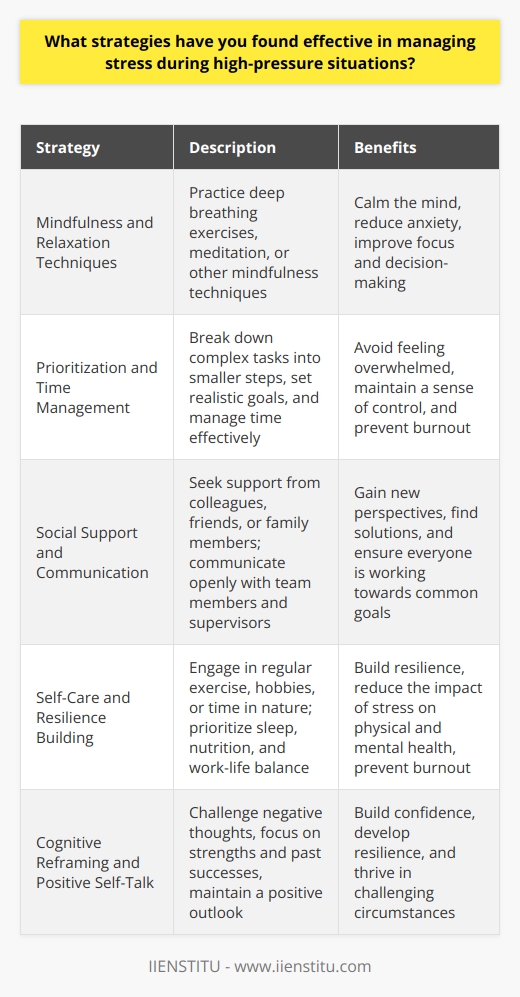
Can you describe a specific instance when you successfully dealt with a stressful situation at work?
One specific instance when I successfully dealt with a stressful situation at work involved a tight project deadline. Our team was tasked with delivering a critical software update for a major client. With only a week left before the delivery date, we encountered a significant technical issue that threatened to derail the entire project.
As the lead developer, I took charge of the situation and quickly assessed the problem's scope. I recognized that solving the issue would require the collective effort of our entire team. I called an emergency meeting to discuss the situation and brainstorm potential solutions.
Developing a Plan of Action
During the meeting, I encouraged open communication and active participation from all team members. We carefully analyzed the problem and proposed various approaches to tackle it. After evaluating the pros and cons of each suggestion, we reached a consensus on the most viable solution.
I created a detailed action plan, breaking down the tasks into smaller, manageable steps. I assigned responsibilities to each team member based on their expertise and strengths. We established clear communication channels to ensure everyone stayed informed and could collaborate effectively.
Implementing the Solution
With the plan in place, we immediately started working on the solution. I closely monitored the progress and provided guidance and support wherever needed. We held daily stand-up meetings to discuss the status, identify any roadblocks, and make necessary adjustments.
Despite the intense pressure and tight timeline, our team remained focused and determined. We put in extra hours and worked collaboratively to resolve the technical issue. I made sure to keep the team motivated by acknowledging their efforts and celebrating small milestones along the way.
Communicating with Stakeholders
Throughout the process, I maintained open communication with the client and other stakeholders. I provided regular updates on our progress and assured them of our commitment to delivering the software update on time. I also proactively addressed any concerns they had and sought their input when necessary.
Successful Outcome
Thanks to the dedication and hard work of our team, we successfully resolved the technical issue and delivered the software update to the client on schedule. The client expressed their satisfaction with the quality of our work and appreciated our ability to handle the stressful situation effectively.
This experience taught me the importance of staying calm under pressure, fostering teamwork, and maintaining clear communication. It reinforced my belief in the power of collaboration and the significance of effective leadership in overcoming challenges.
By breaking down the problem, developing a well-defined plan, and rallying the team towards a common goal, we were able to turn a stressful situation into a successful outcome. The lessons learned from this experience have strengthened my ability to handle similar high-pressure situations in the future.
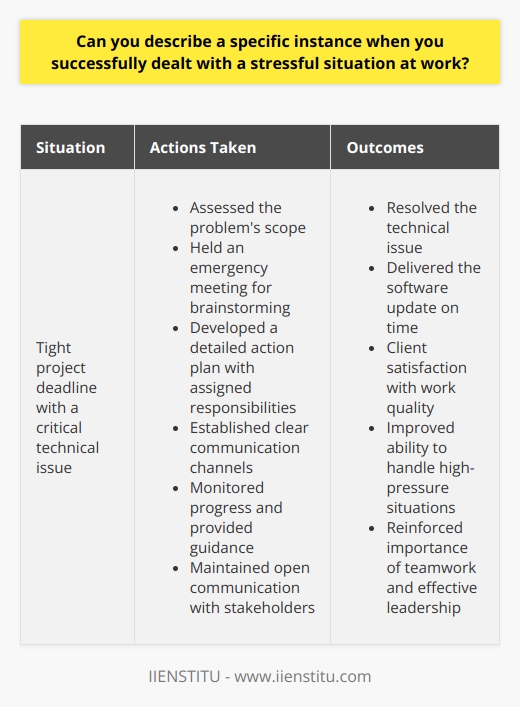
How do you typically deal with stressful situations at work?
Dealing with stressful situations at work is a common challenge that many professionals face. Effective stress management techniques can help individuals maintain their well-being and productivity in the workplace. Here are some strategies that can be employed to cope with stress at work:
Identifying Stressors
The first step in managing stress at work is to identify the sources of stress. This may include heavy workloads, tight deadlines, conflicts with colleagues, or lack of support from management. Once the stressors are identified, it becomes easier to develop a plan to address them.
Time Management
Effective time management is crucial in reducing stress at work. This involves prioritizing tasks, setting realistic goals, and delegating responsibilities when necessary. Breaking down large projects into smaller, manageable tasks can also help alleviate feelings of overwhelm.
Creating a Schedule
Creating a schedule and sticking to it can help individuals stay organized and focused. This may involve blocking out specific times for certain tasks, taking regular breaks, and avoiding procrastination.
Communication
Open and honest communication with colleagues and supervisors can help reduce stress in the workplace. This involves expressing concerns, seeking clarification when needed, and collaborating with others to find solutions to problems.
Assertiveness
Being assertive and setting boundaries can also help manage stress at work. This may involve saying no to unreasonable requests, advocating for one's needs, and communicating expectations clearly.
Self-Care
Taking care of oneself is essential in managing stress at work. This includes getting enough sleep, eating a healthy diet, and engaging in regular exercise. Taking breaks throughout the day to stretch, meditate, or engage in a relaxing activity can also help reduce stress levels.
Mindfulness
Practicing mindfulness can help individuals stay present and focused, even in stressful situations. This may involve deep breathing exercises, meditation, or simply taking a few moments to observe one's thoughts and feelings without judgment.
Seeking Support
Finally, seeking support from colleagues, supervisors, or a professional counselor can be helpful in managing stress at work. Talking through challenges and brainstorming solutions with others can provide a fresh perspective and help individuals feel less alone in their struggles.
Conclusion
Managing stress at work is an ongoing process that requires a combination of strategies and techniques. By identifying stressors, practicing effective time management and communication, prioritizing self-care, and seeking support when needed, individuals can develop resilience and maintain their well-being in the face of workplace challenges.

What strategies have you found most effective in managing pressure and tight deadlines?
Effective strategies for managing pressure and tight deadlines are crucial for maintaining productivity and reducing stress. One of the most important tactics is prioritizing tasks based on their urgency and importance. This involves assessing each task and determining which ones require immediate attention and which can be postponed. By focusing on the most critical tasks first, individuals can ensure that they are making the best use of their time and resources.
Time Management Techniques
Another effective strategy is breaking down large projects into smaller, more manageable tasks. This approach makes the overall project feel less overwhelming and allows for a sense of progress as each small task is completed. It is also essential to set realistic goals and deadlines for each task, taking into account any potential obstacles or delays that may arise.
Effective time management is another key component of managing pressure and tight deadlines. This includes techniques such as creating a schedule, setting aside dedicated work time, and minimizing distractions. By establishing a clear plan and sticking to it, individuals can ensure that they are using their time efficiently and effectively.
Maintaining a Healthy Work-Life Balance
In addition to these practical strategies, it is also important to prioritize self-care and stress management. This may include taking regular breaks, engaging in relaxation techniques such as deep breathing or meditation, and maintaining a healthy work-life balance. By taking care of oneself both physically and mentally, individuals can better cope with the demands of high-pressure situations.
Collaboration and Communication
Collaboration and communication are also essential for managing pressure and tight deadlines. By working with others and delegating tasks when appropriate, individuals can share the workload and benefit from the support and expertise of their colleagues. Clear communication is also crucial for ensuring that everyone is on the same page and working towards the same goals.
Adaptability and Flexibility
Finally, it is important to be adaptable and flexible in the face of changing circumstances. Despite the best-laid plans, unexpected challenges and setbacks are often inevitable. By remaining open to alternative solutions and being willing to adjust course when necessary, individuals can better navigate the demands of high-pressure situations.
In conclusion, managing pressure and tight deadlines requires a combination of practical strategies, self-care, collaboration, and adaptability. By prioritizing tasks, breaking down projects into manageable steps, managing time effectively, and taking care of oneself, individuals can successfully navigate even the most challenging of circumstances. With practice and persistence, these strategies can become invaluable tools for achieving success in both personal and professional endeavors.
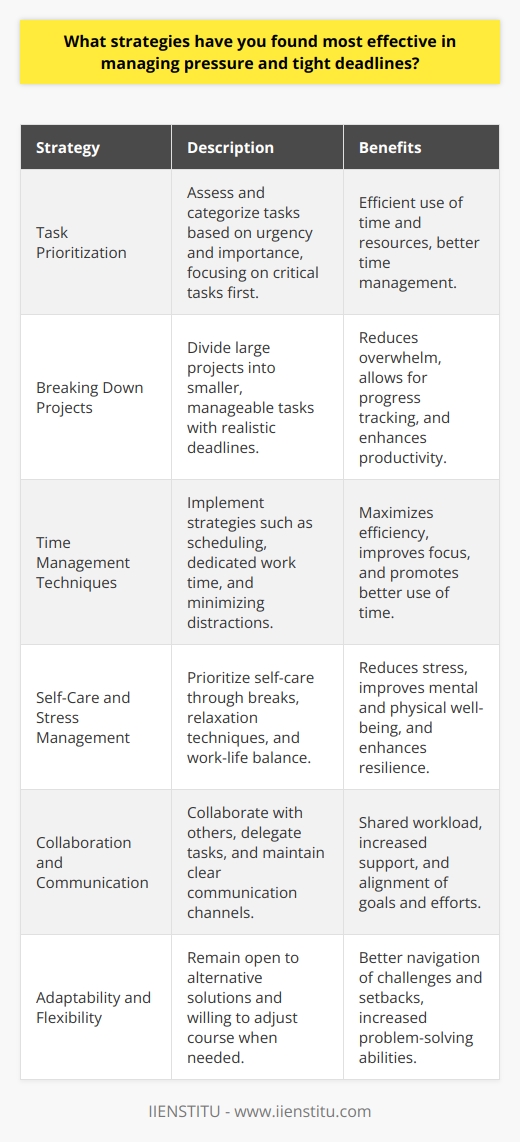
Can you describe a time when you successfully handled a high-pressure situation, and how did you approach it?
Handling high-pressure situations is a crucial skill in both personal and professional life. One instance where I successfully navigated a challenging situation was during my final year of university. I was leading a group project that accounted for a significant portion of our grade, and we were facing a tight deadline.
Assessing the Situation
The first step I took was to assess the situation objectively. I gathered all the relevant information, including the project requirements, deadlines, and the current progress of our team. This helped me identify the key challenges we were facing and the areas where we needed to focus our efforts.
Developing a Plan
Next, I developed a clear plan of action. I broke down the project into smaller, manageable tasks and assigned them to team members based on their strengths and expertise. I also created a timeline with specific milestones to ensure we stayed on track and could monitor our progress.
Communicating Effectively
Effective communication was essential in this high-pressure situation. I made sure to keep all team members informed about our progress, challenges, and any changes to the plan. I also encouraged open dialogue and feedback, creating an environment where everyone felt heard and valued.
Staying Focused and Adaptable
Throughout the project, I remained focused on our goals while being adaptable to change. When unexpected issues arose, I quickly reassessed our plan and made necessary adjustments. I also made sure to prioritize tasks based on their importance and urgency, ensuring that we were always making the most of our time and resources.
Leading by Example
As the team leader, I understood the importance of leading by example. I maintained a positive attitude, even in the face of challenges, and worked hard to motivate and inspire my teammates. I also made sure to recognize and celebrate our successes along the way, boosting morale and keeping everyone engaged.
The Outcome
By approaching this high-pressure situation with a clear plan, effective communication, and a focus on adaptability and leadership, our team successfully completed the project on time and received high marks. This experience taught me the value of staying calm, organized, and proactive in the face of challenges.
In conclusion, successfully handling high-pressure situations requires a combination of skills, including assessment, planning, communication, adaptability, and leadership. By applying these skills and maintaining a positive attitude, it is possible to navigate even the most challenging circumstances and achieve desired outcomes.

How do you handle stress and pressure in your job?
Stress and pressure are inevitable aspects of any job, but effectively managing them is crucial for maintaining productivity and well-being. One key strategy for handling stress is to prioritize tasks and manage time effectively. By focusing on the most critical and time-sensitive tasks first, individuals can reduce the overwhelming feeling of having too much to do. Breaking larger projects into smaller, manageable steps can also help alleviate stress by providing a sense of progress and accomplishment.
Effective Communication and Support
Another important aspect of managing stress and pressure in the workplace is maintaining open lines of communication with colleagues and supervisors. Discussing concerns, seeking clarification on expectations, and asking for help when needed can prevent misunderstandings and alleviate stress caused by uncertainty. Additionally, building a support network of trusted coworkers can provide a valuable outlet for discussing challenges and brainstorming solutions.
Self-Care and Work-Life Balance
Engaging in regular self-care activities outside of work is essential for managing stress and preventing burnout. This may include exercise, hobbies, spending time with loved ones, or practicing relaxation techniques such as meditation or deep breathing. Maintaining a healthy work-life balance by setting boundaries and disconnecting from work during personal time can also help reduce stress and improve overall well-being.
Adaptability and Positive Attitude
Cultivating adaptability and maintaining a positive attitude can also help individuals handle stress and pressure in their job. Embracing change, being open to new ideas, and viewing challenges as opportunities for growth can help reframe stressful situations in a more positive light. Focusing on the aspects of the job that one can control, rather than dwelling on external factors, can also help maintain a sense of empowerment and reduce stress.
Continuous Learning and Professional Development
Engaging in continuous learning and professional development can also help manage stress and pressure in the workplace. By acquiring new skills and knowledge, individuals can increase their confidence and feel better equipped to handle the demands of their job. Attending workshops, conferences, or training sessions can provide fresh perspectives and strategies for managing stress and improving job performance.
In conclusion, handling stress and pressure in the workplace requires a multifaceted approach that includes effective time management, open communication, self-care, adaptability, and continuous learning. By implementing these strategies, individuals can maintain their well-being and thrive in their chosen profession, even in the face of challenging circumstances.
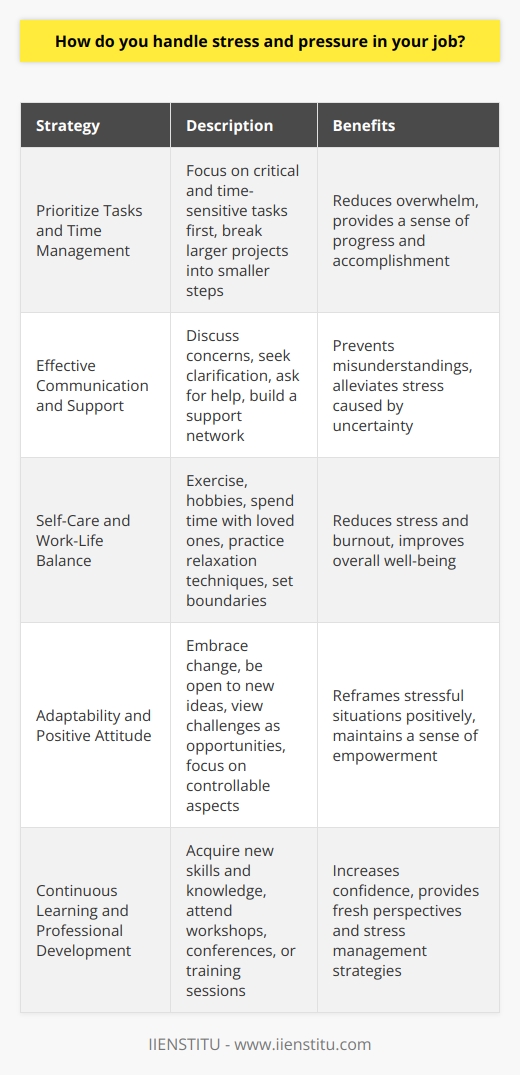
What strategies do you employ to manage stress effectively in the workplace?
Effective stress management in the workplace is crucial for maintaining productivity, well-being, and overall job satisfaction. Employing a combination of strategies can help individuals cope with work-related stress and prevent burnout. One key approach is to prioritize tasks and manage time effectively, ensuring that deadlines are met without compromising quality or personal well-being.
Prioritizing Self-Care
Engaging in regular self-care activities, such as exercise, meditation, or hobbies, can provide a much-needed break from work-related stressors. These activities promote relaxation, reduce anxiety, and improve overall mental health. Additionally, maintaining a healthy work-life balance is essential for managing stress levels.
Setting clear boundaries between work and personal life, such as avoiding work-related tasks during off-hours, can help prevent work stress from spilling over into other areas of life. Communicating openly with colleagues and supervisors about workload concerns or conflicts can also alleviate stress by fostering a supportive work environment.
Developing Resilience
Building resilience is another effective strategy for managing stress in the workplace. Embracing challenges as opportunities for growth and learning can help reframe stressful situations in a more positive light. Cultivating a growth mindset and focusing on solutions rather than dwelling on problems can enhance resilience and reduce stress levels.
Seeking Support
Seeking support from colleagues, supervisors, or employee assistance programs can provide valuable resources for managing work-related stress. Sharing concerns and collaborating with others can lead to problem-solving and a greater sense of control over stressful situations.
Implementing Stress-Reduction Techniques
Incorporating stress-reduction techniques, such as deep breathing exercises or mindfulness practices, into daily work routines can help manage stress in the moment. These techniques promote relaxation and can be performed discreetly at a desk or during breaks.
By employing a combination of these strategies, individuals can effectively manage stress in the workplace, leading to improved well-being, job satisfaction, and overall productivity. Prioritizing self-care, developing resilience, seeking support, and implementing stress-reduction techniques are key components of a comprehensive approach to workplace stress management.
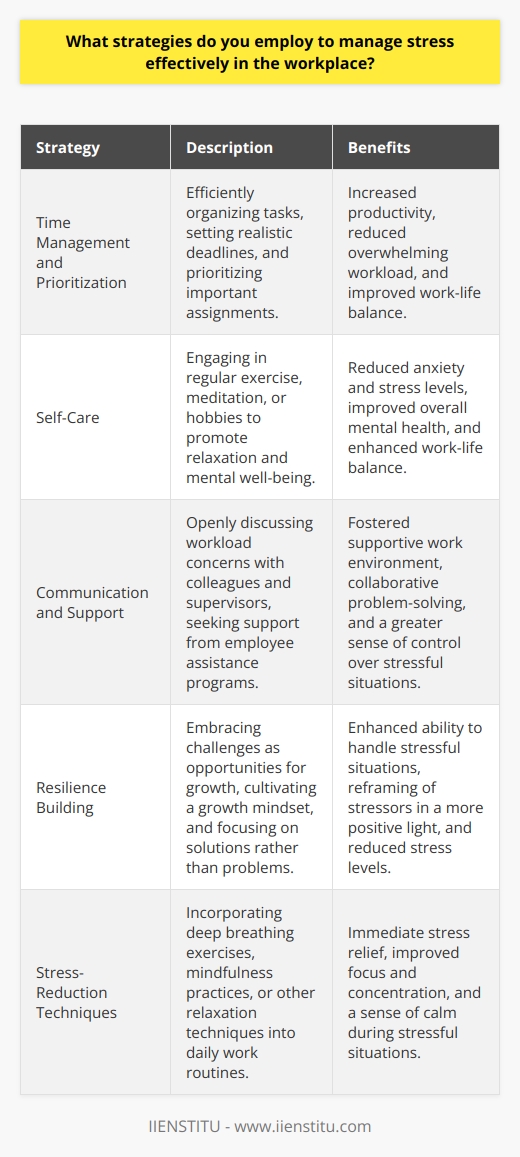
How do you maintain your composure and productivity when faced with high-pressure situations at work?
Maintaining composure and productivity in high-pressure work situations is crucial for professional success and personal well-being. Several strategies can help individuals navigate these challenging circumstances effectively. First, it is essential to cultivate a mindset of resilience and adaptability. Embracing the idea that challenges are opportunities for growth and learning can help reframe high-pressure situations in a more positive light.
Prioritize and Focus
When faced with high-pressure situations, it is crucial to prioritize tasks and focus on the most critical objectives. Break down complex projects into manageable steps and create a clear action plan. This approach helps maintain a sense of control and prevents overwhelming feelings. Additionally, minimize distractions by creating a dedicated workspace, setting boundaries, and communicating your needs to colleagues.
Practice Mindfulness and Stress Management
Incorporating mindfulness techniques into your daily routine can significantly improve your ability to handle high-pressure situations. Deep breathing exercises, meditation, and yoga can help reduce stress and increase mental clarity. These practices allow you to stay grounded and focused, even in the face of adversity. Moreover, engaging in regular physical exercise and maintaining a healthy lifestyle can boost your overall resilience and stress management capabilities.
Communicate Effectively
Open and transparent communication is key to navigating high-pressure situations in the workplace. Regularly update your team and supervisors on your progress, challenges, and needs. Seek clarification when necessary and don't hesitate to ask for support or resources. Effective communication helps align expectations, prevents misunderstandings, and fosters a collaborative environment where everyone can work together to overcome obstacles.
Embrace a Growth Mindset
Adopting a growth mindset is essential for maintaining composure and productivity under pressure. View challenges as opportunities to learn, grow, and develop new skills. Embrace constructive feedback and use it to improve your performance. Celebrate your successes, no matter how small, and learn from your failures. By cultivating a growth mindset, you can approach high-pressure situations with confidence and resilience.
Take Breaks and Practice Self-Care
Taking regular breaks throughout the day is crucial for maintaining productivity and reducing stress. Step away from your workstation, stretch, or engage in brief relaxation techniques. Prioritize self-care activities outside of work, such as spending time with loved ones, pursuing hobbies, and getting sufficient rest. These practices help you recharge, maintain a healthy work-life balance, and approach high-pressure situations with a fresh perspective.
Seek Support and Mentorship
Don't hesitate to seek support from colleagues, supervisors, or mentors when faced with high-pressure situations. Collaborate with team members, delegate tasks when appropriate, and learn from the experiences of others. Seeking guidance and mentorship can provide valuable insights and strategies for navigating challenging circumstances. Remember, you don't have to face high-pressure situations alone – lean on your support network when needed.

What are some common sample stress interview questions and how should they be answered?
Stress interviews are designed to assess a candidate's ability to handle pressure and think on their feet. Interviewers may ask challenging questions or create uncomfortable situations to observe how the candidate reacts. Some common stress interview questions include:
1. "How would you handle a difficult customer who is angry and demanding?"
When answering this question, emphasize your ability to remain calm and professional under pressure. Explain that you would listen actively to the customer's concerns, empathize with their situation, and work towards finding a solution that satisfies both the customer and the company's policies.
2. "Tell me about a time when you failed at something. How did you handle it?"
This question aims to assess your resilience and ability to learn from mistakes. Be honest about a past failure, but focus on what you learned from the experience and how you applied those lessons to future situations. Demonstrate that you can take responsibility for your actions and adapt to challenges.
3. "How do you handle conflicts with coworkers?"
Interviewers want to know that you can work well in a team and resolve conflicts professionally. Describe a specific situation where you had a disagreement with a colleague, and explain how you addressed the issue through open communication, active listening, and a willingness to compromise. Emphasize your ability to maintain positive working relationships.
Tips for handling stress interviews:
Stay calm and composed, even if the interviewer is being confrontational or aggressive.
Take a moment to collect your thoughts before responding to challenging questions.
Be honest and authentic in your answers, but avoid negativity or blaming others.
Demonstrate your problem-solving skills and ability to think critically under pressure.
Maintain confident body language and eye contact throughout the interview.
Remember, the goal of a stress interview is not to make you feel uncomfortable but to assess your ability to handle difficult situations. By remaining calm, confident, and focused on your strengths, you can demonstrate that you have the resilience and adaptability needed to succeed in a challenging work environment.

How can I prepare for sample stress interview questions to increase my chances of success?
Preparing for sample stress interview questions is crucial to increase your chances of success in a high-pressure interview setting. Stress interviews are designed to assess a candidate's ability to handle challenging situations and perform under pressure. By anticipating potential stress interview questions and practicing your responses, you can demonstrate your resilience, problem-solving skills, and ability to maintain composure in demanding circumstances.
Research Common Stress Interview Questions
Begin your preparation by researching common stress interview questions. Look for questions that aim to gauge your reaction to pressure. Examples include "How do you handle conflict with a colleague?" or "Describe a time when you failed and how you dealt with it." Understanding the types of questions you may encounter allows you to formulate effective responses.
Reflect on Your Past Experiences
Reflect on your past experiences and identify instances where you successfully navigated stressful situations. Consider challenges you faced at work, school, or in your personal life. Analyze how you approached these situations, the actions you took, and the outcomes you achieved. Having concrete examples ready will strengthen your responses during the interview.
Practice Stress Management Techniques
Practice stress management techniques to maintain composure during the interview. Deep breathing exercises, mindfulness, and positive self-talk can help you stay calm and focused. Regularly practicing these techniques will make it easier to employ them when faced with high-pressure interview questions.
Role-Play with a Partner
Engage in role-play sessions with a partner to simulate a stress interview. Have your partner ask you challenging questions and provide feedback on your responses. This practice will help you become more comfortable with handling unexpected or confrontational questions. It also allows you to refine your answers and improve your delivery.
Focus on Your Problem-Solving Abilities
When answering stress interview questions, focus on highlighting your problem-solving abilities. Provide specific examples of how you identified problems, developed solutions, and implemented them effectively. Emphasize your analytical thinking, creativity, and adaptability in addressing complex challenges.
Maintain a Positive Attitude
Maintain a positive attitude throughout the interview, even when faced with high-pressure questions. Avoid becoming defensive or confrontational. Instead, remain calm, confident, and professional. Acknowledge the challenges presented and express your willingness to tackle them head-on. A positive mindset demonstrates your resilience and ability to thrive under pressure.
Seek Feedback and Continuously Improve
After each mock interview or practice session, seek feedback from your partner or a trusted mentor. Ask for their perspective on your performance and areas where you can improve. Continuously refine your responses, body language, and overall approach based on the feedback received. Embracing a growth mindset will help you learn from each experience and enhance your interviewing skills.
By diligently preparing for sample stress interview questions, you can increase your chances of success in high-pressure interview situations. Research common questions, reflect on your experiences, practice stress management techniques, and engage in role-play sessions. Focus on showcasing your problem-solving abilities and maintaining a positive attitude. Continuously seek feedback and strive for improvement. With thorough preparation and the right mindset, you can confidently tackle stress interviews and demonstrate your capability to excel under pressure.
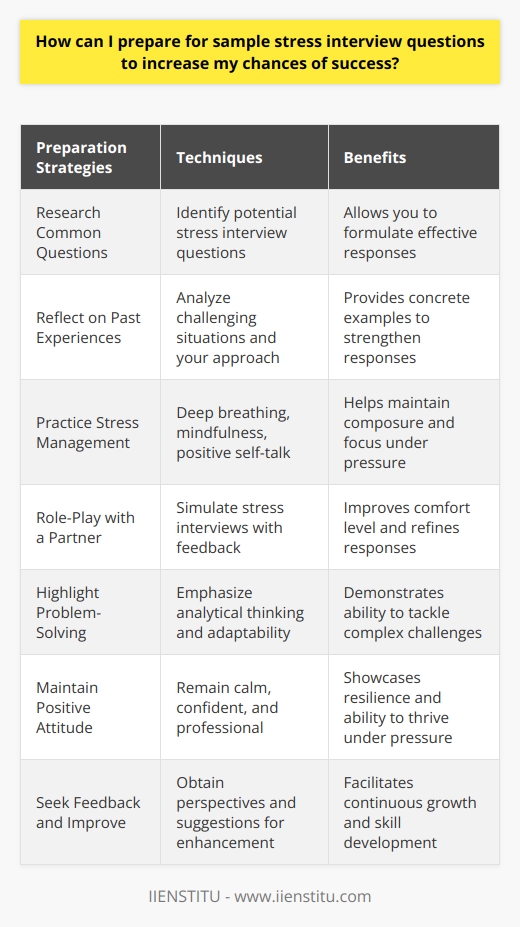
What are the most effective strategies for responding to sample stress interview questions during a job interview?
Responding effectively to sample stress interview questions during a job interview requires a combination of preparation, self-awareness, and composure. Stress interviews are designed to assess a candidate's ability to handle pressure and think on their feet. To navigate these challenging situations successfully, job seekers should employ several key strategies.
Research and Anticipate Potential Questions
Familiarize yourself with common stress interview questions and practice your responses beforehand. This preparation will boost your confidence and help you stay calm under pressure. Analyze the job description and company culture to anticipate the types of questions you may face.
Examples of Common Stress Interview Questions:
How do you handle conflict with a coworker?
Describe a time when you failed at a task.
How do you prioritize tasks when everything seems urgent?
Maintain a Positive Attitude and Body Language
Approach stress interview questions with a positive mindset. Remain confident, maintain eye contact, and use open body language. Avoid defensiveness or frustration, even if the questions seem unfair or provocative. A calm and professional demeanor demonstrates your ability to handle challenging situations gracefully.
Use the STAR Method to Structure Your Answers
When responding to stress interview questions, use the STAR method to provide clear and concise answers. STAR stands for Situation, Task, Action, and Result. Briefly describe the situation, explain your role and the task at hand, detail the actions you took to address the challenge, and highlight the positive results achieved.
Example of Using the STAR Method:
Question: Describe a time when you had to make an unpopular decision.
Answer: In my previous role, I had to implement a new policy that initially faced resistance from the team. I clearly explained the rationale behind the decision, listened to their concerns, and worked collaboratively to find solutions. As a result, we successfully implemented the policy and improved overall efficiency.
Showcase Your Problem-Solving Skills
Stress interview questions often present hypothetical challenges or problems. Use these opportunities to showcase your problem-solving abilities. Explain your thought process, consider multiple perspectives, and propose creative solutions. Demonstrating your analytical thinking and adaptability will impress the interviewer.
Emphasize Your Resilience and Growth Mindset
When faced with questions about past failures or challenges, focus on the lessons learned and personal growth achieved. Discuss how you bounced back from setbacks, learned from your mistakes, and applied those insights to future situations. Highlighting your resilience and ability to learn from adversity showcases your potential for growth within the organization.
Remember, the key to succeeding in a stress interview is to remain composed, confident, and authentic. By preparing ahead of time, maintaining a positive attitude, and showcasing your problem-solving skills and resilience, you can effectively navigate sample stress interview questions and leave a lasting positive impression on the interviewer.
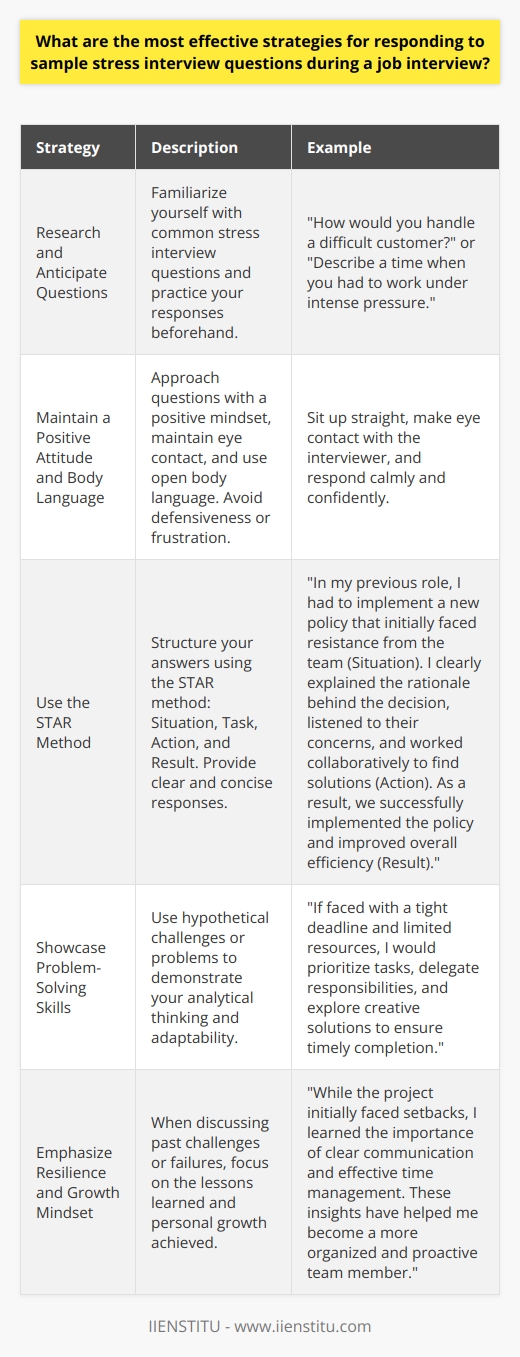
How do you typically handle stressful situations?
When faced with stressful situations, I employ a combination of strategies to effectively manage and mitigate the negative impacts of stress. These strategies involve a proactive approach to problem-solving, coupled with mindfulness techniques and self-care practices that help maintain emotional equilibrium and mental clarity.
Identifying Stressors and Developing a Plan of Action
The first step in managing stressful situations is to identify the specific sources of stress. By pinpointing the root causes, I can develop a targeted plan of action to address each stressor systematically. This process involves breaking down complex problems into smaller, more manageable components, allowing for a more focused and efficient approach to problem-solving.
Prioritizing Tasks and Setting Realistic Goals
Once I have identified the stressors, I prioritize tasks based on their urgency and importance. Setting realistic goals and timelines helps to create a sense of structure and control, reducing the overwhelming nature of stressful situations. By tackling high-priority tasks first and breaking larger goals into smaller, achievable milestones, I can maintain a sense of progress and accomplishment, which helps to alleviate stress.
Practicing Mindfulness and Stress-Reduction Techniques
In addition to problem-solving strategies, I incorporate mindfulness and stress-reduction techniques into my daily routine. These practices help to regulate emotions, improve focus, and promote a sense of inner calm, even in the face of challenging circumstances.
Deep Breathing and Meditation
Deep breathing exercises and meditation are powerful tools for reducing stress and anxiety. By taking slow, deep breaths and focusing on the present moment, I can activate the body's relaxation response, lowering heart rate and blood pressure. Regular meditation practice helps to cultivate a sense of emotional balance and mental clarity, enhancing my ability to navigate stressful situations with greater ease and resilience.
Physical Exercise and Self-Care
Engaging in regular physical exercise is another effective way to manage stress. Exercise releases endorphins, improves mood, and provides a healthy outlet for pent-up tension and frustration. Furthermore, prioritizing self-care activities, such as getting enough sleep, maintaining a balanced diet, and engaging in hobbies or relaxation techniques, helps to build emotional resilience and reduce the overall impact of stress on my well-being.
Seeking Support and Maintaining Perspective
When facing particularly challenging stressful situations, it is essential to seek support from others and maintain a healthy perspective. Talking to trusted friends, family members, or professionals can provide valuable insights, emotional support, and a fresh perspective on the situation at hand.
Reframing Negative Thoughts
Maintaining a positive outlook and reframing negative thoughts is crucial in managing stress. By challenging negative self-talk and focusing on the potential opportunities for growth and learning, I can shift my mindset from one of helplessness to one of empowerment. This cognitive reframing technique helps to build resilience and adaptability in the face of adversity.
In conclusion, my approach to handling stressful situations involves a multi-faceted strategy that encompasses problem-solving, mindfulness, self-care, and seeking support when needed. By employing these techniques consistently and proactively, I am better equipped to navigate the challenges of life with greater resilience, emotional balance, and mental clarity.
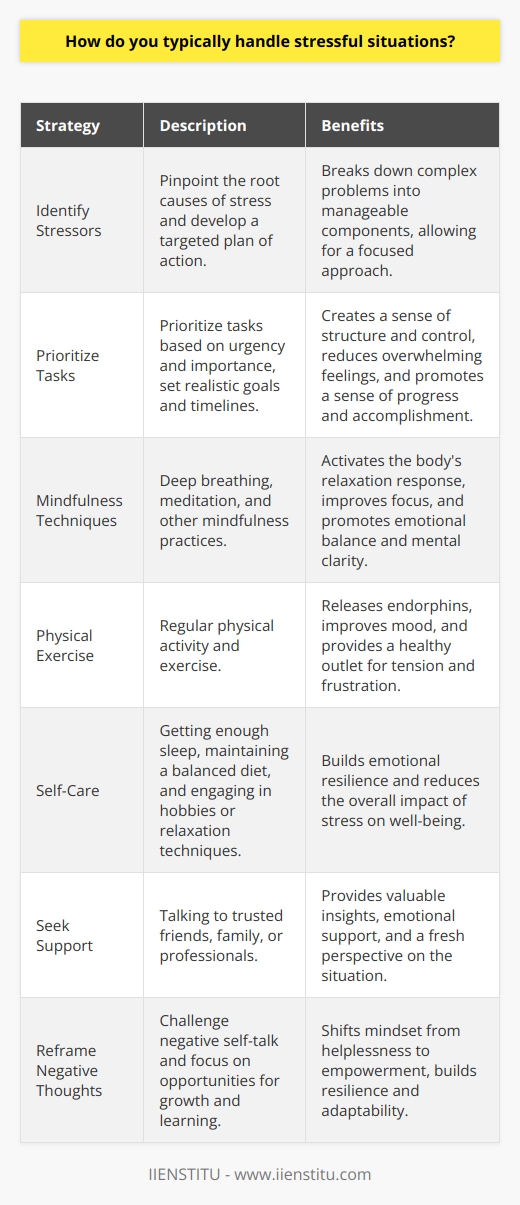
What strategies do you employ to cope with stress effectively?
Coping with stress effectively requires a multifaceted approach that includes various strategies and techniques. One of the most important strategies is to identify the sources of stress in your life. This can help you develop targeted solutions to manage or eliminate these stressors. Another crucial strategy is to practice good self-care habits, such as getting enough sleep, eating a healthy diet, and engaging in regular exercise. These habits can help improve your overall well-being and increase your resilience to stress.
Time Management and Prioritization
Effective time management and prioritization are also essential for coping with stress. By organizing your tasks and responsibilities, you can reduce feelings of overwhelm and maintain a sense of control over your life. This may involve setting realistic goals, breaking large tasks into smaller, manageable steps, and learning to say "no" to commitments that are not essential or aligned with your priorities. Additionally, creating a daily or weekly schedule can help you structure your time and ensure that you are making progress toward your goals.
Relaxation Techniques
Incorporating relaxation techniques into your daily routine can be a powerful way to manage stress. Deep breathing exercises, meditation, and progressive muscle relaxation are all effective methods for reducing tension and promoting a sense of calm. These techniques can be practiced anywhere and at any time, making them accessible tools for stress management. Regular practice of relaxation techniques can help you develop a greater sense of inner peace and improve your ability to handle stressful situations.
Social Support and Communication
Building a strong support system and maintaining open communication with others can also help you cope with stress. Talking to friends, family members, or a therapist about your concerns and feelings can provide a sense of relief and help you gain new perspectives on your challenges. Engaging in social activities and hobbies that you enjoy can also be a great way to reduce stress and maintain a sense of balance in your life.
Mindfulness and Positive Thinking
Practicing mindfulness and cultivating a positive outlook can also be effective strategies for managing stress. Mindfulness involves being present in the moment and observing your thoughts and feelings without judgment. This practice can help you develop a greater sense of self-awareness and emotional regulation, which can be valuable tools for coping with stress. Additionally, focusing on the positive aspects of your life and reframing negative thoughts can help you maintain a more optimistic and resilient mindset in the face of challenges.
Seeking Professional Help
If stress becomes overwhelming or persistent, it may be necessary to seek professional help. A mental health professional, such as a psychologist or counselor, can provide additional support and guidance in developing effective coping strategies. They can also help you identify and address any underlying mental health concerns that may be contributing to your stress levels.
Conclusion
Coping with stress effectively is a continuous process that requires a combination of strategies and self-awareness. By identifying your stressors, practicing self-care, managing your time, engaging in relaxation techniques, building social support, cultivating mindfulness and positive thinking, and seeking professional help when needed, you can develop a comprehensive approach to stress management that promotes overall well-being and resilience.
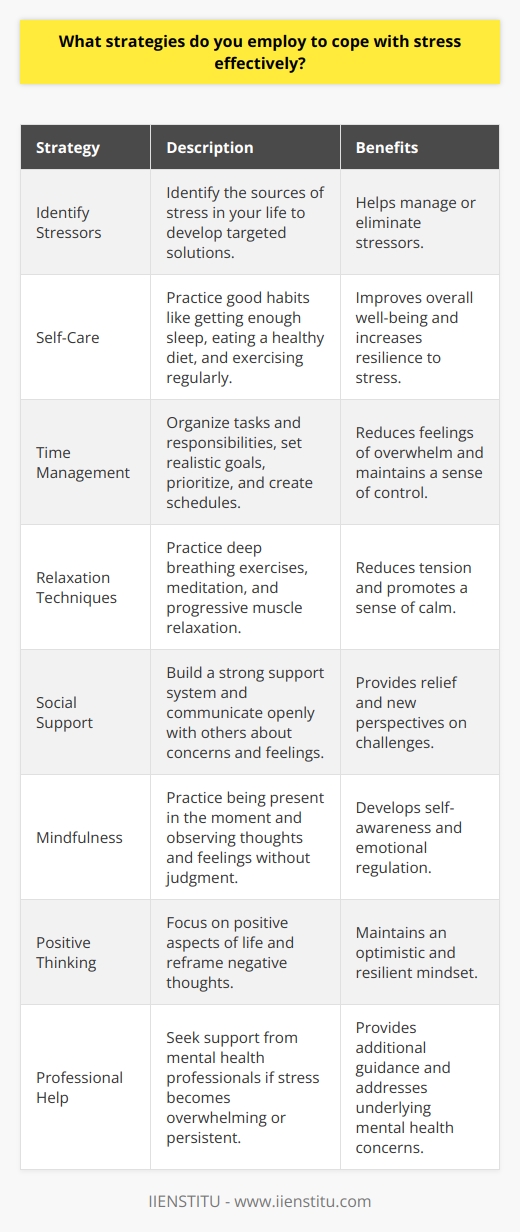
In what ways do you manage and alleviate stress in your life?
Stress management is a crucial aspect of maintaining overall well-being and preventing the negative effects of chronic stress. Engaging in regular physical activity, such as exercising or practicing yoga, can help reduce stress levels by releasing endorphins and promoting relaxation. Mindfulness practices, including meditation and deep breathing exercises, can also be effective in managing stress by calming the mind and reducing anxiety.
Importance of a Balanced Lifestyle
Maintaining a balanced lifestyle is essential for effective stress management. This involves setting aside time for hobbies and activities that bring joy and fulfillment, as well as ensuring adequate sleep and rest. Establishing a consistent sleep schedule and creating a relaxing bedtime routine can improve sleep quality and reduce stress levels.
Nutrition and Stress Management
Proper nutrition also plays a significant role in stress management. Consuming a balanced diet rich in fruits, vegetables, whole grains, and lean proteins can provide the necessary nutrients to support the body's stress response. Limiting the intake of caffeine, alcohol, and processed foods can further contribute to reducing stress levels.
Social Support and Stress Relief
Building and maintaining a strong support system of family, friends, and loved ones can be a powerful tool in managing stress. Engaging in open and honest communication, seeking advice, and sharing concerns with trusted individuals can provide a sense of connection and reduce feelings of isolation. Participating in social activities and volunteering can also foster a sense of purpose and contribute to stress relief.
Time Management Strategies
Effective time management is crucial for reducing stress levels. Prioritizing tasks, setting realistic goals, and breaking large projects into smaller, manageable steps can help prevent overwhelming feelings and reduce stress. Learning to say no to non-essential commitments and delegating tasks when possible can also alleviate stress and promote a sense of control.
Relaxation Techniques
Incorporating relaxation techniques into daily routines can be an effective way to manage stress. Progressive muscle relaxation, guided imagery, and deep breathing exercises can promote a sense of calm and reduce tension in the body. Engaging in activities that promote creativity, such as writing, painting, or playing music, can also serve as healthy outlets for stress relief.
Professional Support
When stress becomes overwhelming or difficult to manage independently, seeking professional support can be beneficial. Consulting with a mental health professional, such as a therapist or counselor, can provide personalized strategies for stress management and help address underlying issues that may contribute to stress. Employee assistance programs and community resources can also offer valuable support and guidance in managing stress.
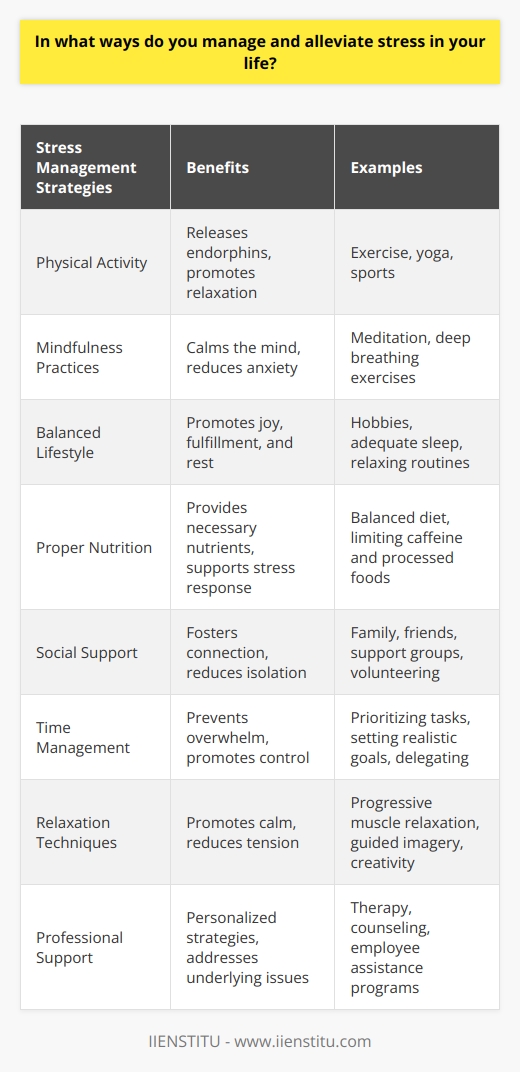
How do you handle stress and pressure as a fresher in a new job?
As a fresher in a new job, handling stress and pressure can be challenging. However, there are several strategies that can help you manage these feelings effectively. First, it's essential to maintain a positive attitude and focus on your goals. Remember that everyone experiences stress and pressure at work, and it's a natural part of the learning process.
Prioritize and Organize
One of the most effective ways to handle stress and pressure is to prioritize your tasks and organize your workload. Make a to-do list and tackle the most important and urgent tasks first. Break larger projects into smaller, manageable steps to avoid feeling overwhelmed. Use tools like calendars, project management software, or productivity apps to help you stay on track.
Communicate with Your Team
Don't hesitate to ask for help or clarification when needed. Your colleagues and supervisors are there to support you. Open communication can prevent misunderstandings and help you feel more confident in your role. Regularly update your manager on your progress and any challenges you face. This will demonstrate your proactivity and willingness to learn.
Take Breaks and Practice Self-Care
Taking regular breaks throughout the day can help you manage stress and maintain focus. Step away from your desk, stretch, or take a short walk. Engage in activities that promote relaxation, such as deep breathing exercises or meditation. After work, make time for hobbies, exercise, and social connections. Maintaining a healthy work-life balance is crucial for reducing stress and preventing burnout.
Learn and Adapt
Embrace the opportunity to learn and grow in your new role. Take advantage of training sessions, workshops, or mentorship programs offered by your company. Continuously update your skills and knowledge to boost your confidence and performance. Remember that everyone makes mistakes; view them as learning experiences rather than failures.
Seek Support
If you find yourself struggling with persistent stress or anxiety, don't hesitate to seek support. Many companies offer employee assistance programs (EAPs) that provide confidential counseling and resources. Reach out to trusted colleagues, friends, or family members for emotional support and guidance. Remember, it's okay to ask for help when you need it.
Celebrate Your Achievements
Recognize and celebrate your accomplishments, no matter how small they may seem. Acknowledging your progress and successes can boost your motivation and confidence. Share your achievements with your team and superiors to showcase your growth and contributions to the company.
In conclusion, handling stress and pressure as a fresher in a new job requires a combination of strategies. Prioritize and organize your tasks, communicate effectively with your team, take breaks and practice self-care, continuously learn and adapt, seek support when needed, and celebrate your achievements. By implementing these techniques, you can navigate the challenges of your new role with greater ease and confidence.

What strategies can freshers employ to manage stress and pressure effectively?
Freshers can employ various strategies to manage stress and pressure effectively as they navigate their new academic journey. One crucial approach is to prioritize self-care by maintaining a balanced lifestyle that includes regular exercise, a healthy diet, and sufficient sleep. Engaging in physical activities releases endorphins, reduces tension, and promotes overall well-being. Additionally, adopting effective time management techniques, such as creating a schedule, setting realistic goals, and breaking tasks into smaller, manageable chunks, can help freshers stay organized and reduce feelings of overwhelming pressure.
Building a Support System
Another essential strategy for managing stress is to build a strong support system. Freshers should actively seek out connections with peers, family members, and mentors who can offer guidance, encouragement, and a listening ear during challenging times. Joining clubs, organizations, or study groups that align with their interests can foster a sense of belonging and provide opportunities for social interaction and collaboration. Moreover, freshers should not hesitate to reach out for professional help, such as counseling services, when needed, as these resources can provide valuable tools and strategies for coping with stress and maintaining mental well-being.
Developing Resilience and Adaptability
Cultivating resilience and adaptability is crucial for freshers to effectively manage stress and pressure. Embracing a growth mindset, which views challenges as opportunities for learning and personal development, can help freshers reframe their perspective and approach difficulties with a more positive outlook. Practicing mindfulness techniques, such as deep breathing exercises or meditation, can also help freshers stay grounded in the present moment, reduce anxiety, and enhance their ability to cope with stressful situations. By developing these skills, freshers can build the necessary mental and emotional strength to navigate the demands of their new academic environment.
Maintaining Academic-Life Balance
Striking a healthy balance between academic commitments and personal life is vital for freshers to manage stress effectively. Setting aside dedicated time for hobbies, relaxation, and social activities can provide a much-needed respite from the pressures of coursework and deadlines. Freshers should also be mindful of their limits and learn to say no to non-essential commitments that may contribute to feelings of being overwhelmed. By prioritizing self-care and maintaining a balanced lifestyle, freshers can ensure that they have the energy and mental clarity necessary to tackle academic challenges and excel in their studies.
Seeking Help and Resources
Freshers should not hesitate to seek help and utilize the resources available to them when managing stress and pressure. Many universities offer support services, such as counseling centers, academic advisors, and peer mentoring programs, which can provide valuable guidance and assistance. Freshers can also take advantage of workshops, seminars, or online resources that focus on stress management techniques, study skills, and time management strategies. By actively seeking out these resources and implementing the skills and knowledge gained, freshers can develop a comprehensive toolkit for effectively navigating the challenges of their new academic journey and maintaining their overall well-being.
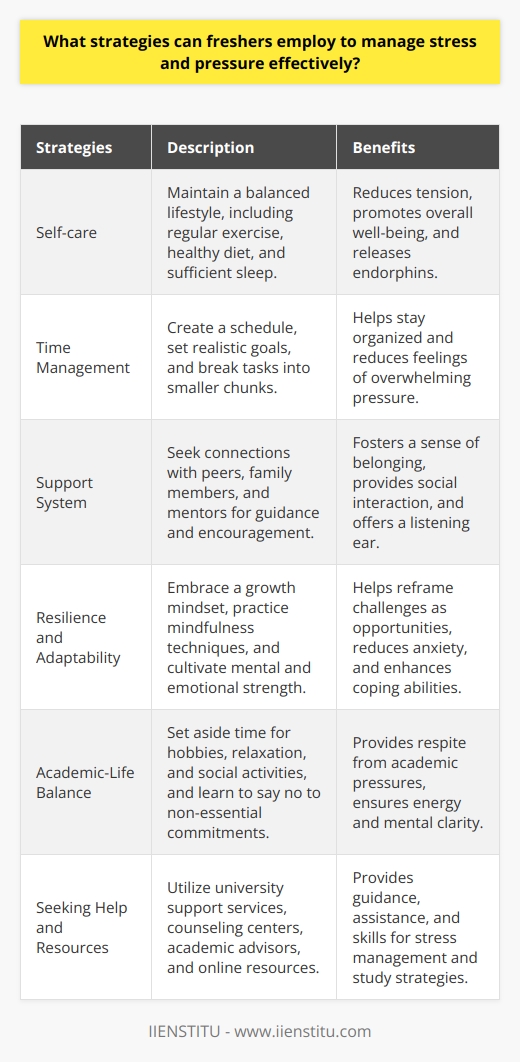
How can freshers maintain a healthy work-life balance while dealing with stress and pressure?
Maintaining a healthy work-life balance is crucial for freshers as they navigate the challenges of a new job. Stress and pressure can quickly take a toll on mental and physical well-being if not managed effectively. To achieve a sustainable balance, freshers should prioritize self-care, set clear boundaries, and communicate openly with their employers.
Prioritizing Self-Care
Self-care is essential for managing stress and maintaining a healthy work-life balance. Freshers should make time for activities that promote physical and mental well-being, such as regular exercise, healthy eating, and sufficient sleep. Engaging in hobbies and social activities outside of work can also help reduce stress and improve overall happiness.
Setting Clear Boundaries
Setting clear boundaries between work and personal life is crucial for maintaining a healthy balance. Freshers should establish specific work hours and stick to them as much as possible. It's important to disconnect from work-related tasks and communications outside of these designated hours to allow for proper rest and relaxation.
Communicating with Employers
Open communication with employers is key to managing stress and pressure in the workplace. Freshers should feel comfortable discussing their workload and any challenges they face with their supervisors. By keeping lines of communication open, freshers can work with their employers to find solutions and make necessary adjustments to maintain a healthy work-life balance.
Seeking Support
Freshers should not hesitate to seek support when needed, whether from colleagues, mentors, or professional resources. Building a strong support network can help freshers navigate the challenges of a new job and maintain a healthy work-life balance. Many companies offer employee assistance programs that provide counseling and other resources for managing stress and promoting well-being.
Time Management Strategies
Effective time management is essential for maintaining a healthy work-life balance. Freshers should prioritize tasks, break large projects into smaller, manageable steps, and use tools like calendars and to-do lists to stay organized. By managing their time efficiently, freshers can reduce stress and ensure they have adequate time for both work and personal pursuits.
Conclusion
Achieving a healthy work-life balance is an ongoing process that requires effort and commitment. By prioritizing self-care, setting clear boundaries, communicating with employers, seeking support, and employing effective time management strategies, freshers can successfully manage stress and pressure while maintaining a fulfilling personal life. Remember, a healthy work-life balance is essential for long-term success and well-being in both professional and personal spheres.
